|
holy moly I just got to the end of this thread, after reading it on and off at work for about two years. I'd like to thank everyone that made my lunch breaks 1000% more interesting. one weird thing that I noticed across all of the games that try to do dark mature etc. horror (LotFP, Unhallowed Metropolis, that Rifts zombie world, AFMBE, etc.) is that they all inevitably mention that some faction goes so far as to become cannibals and that they keep breeding pens of real humans so that they can eat human babies! like, what? the amount of energy required to bring one kid to full term is ridiculous, not to mention you're likely only getting 1 kid meal every 9-ish months per mother. plus, a newborn human has got to have next to no nutritional value, so then if you're actively raising them to eat them, you're pumping even more energy into the equation without getting anything close to an appreciable return. I don't know why this became something I noticed, but it really sticks out to me. I can take for granted that a zombie apocalypse happens, fine that's a common fictional setting, but the idea that anybody would bother to try and breed humans for food completely destroys my suspension of belief.
|
|
|
|

|
| # ¿ Jul 27, 2024 04:05 |
|
Hostile V posted:Really here are the four pillars of Pulp that the game puts forth: Hostile V posted:Modified Qualities and Drawbacks I never understand why game designers want to do this. "the point of the game is that you're all larger than life heroes that are accomplishing legendary deeds against the darkest forces of evil. don't agonize over whether or not your adventures could work in the 'real world' because reality is only a suggestion for amazing heroes like you" "also let's obliquely codify the mechanical effects of racism because people were racist back in the day so clearly that's something we have to include, despite our stated premise that your heroes shouldn't have to deal with the notion of whether or not their escapades are realistic. if there's no penalty for being a racial minority, my verisimilitude gets soft" it's the same lovely design space as giving women a penalty to strength and intelligence but a bonus to charisma.
|
|
|
|
FMguru posted:It's always telling exactly where designers put the breakpoint between "just let it slide man, it's a magical high adventure setting for pete's sake" and "ack, my verisimilitude!1!". Lot of D&D versions were perfectly happy to elide the definition of a hit point or how monsters in dungeons fed themselves, but woe betide the woman who tried to have 18 strength. it also implies that your GM is expected to indulge in some light racial discrimination during gameplay, because what would be the point of taking a character flaw if it never came up in the story? it'd be like taking "Fatal Alergy: Cinnamon" and then never explicitly forcing your character to have to survive an encounter full of deliciously deadly confections! maybe it's a canary in the coal mine that was purposely put into the game. a way to raise a red flag about your GM without having to specifically have any uncomfortable conversations. "if your GM actually allows you to take the racism flaw, get the gently caress out of his mom's basement" edit: gahhhh it's just got so many shameful loving implications about the people that designed the game. "why would we need to mechanically differentiate between the ethnic background of different characters in a game that's all about high octane, double-fisted action?" "well I mean otherwise what would be the point of even including non-white ethnicities? wait, do you mean ethnic characters should get some kind of racial bonus instead of treating it like a flaw?" does it also imply that your character literally can't be non-white if they don't take the racism flaw? or if they can, then why the hell would you include a racism flaw? "we believe that our core audience is closet racists that are dying for the opportunity to share their myopic world views with their friends via the medium of cooperative story telling!" Freaking Crumbum fucked around with this message at 22:21 on Aug 30, 2017 |
|
|
|
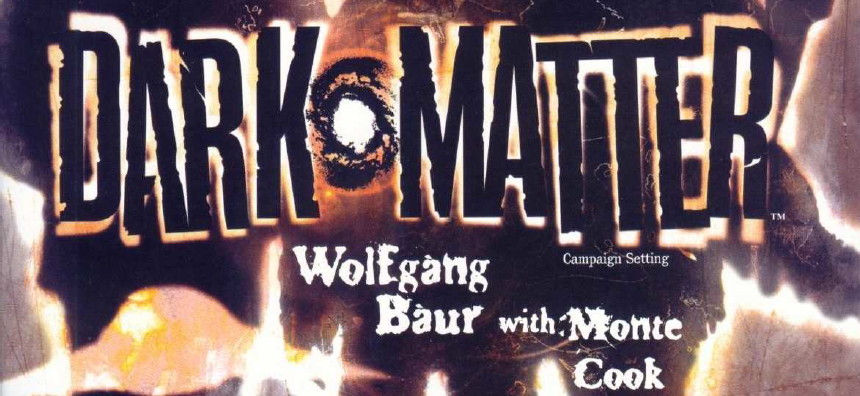 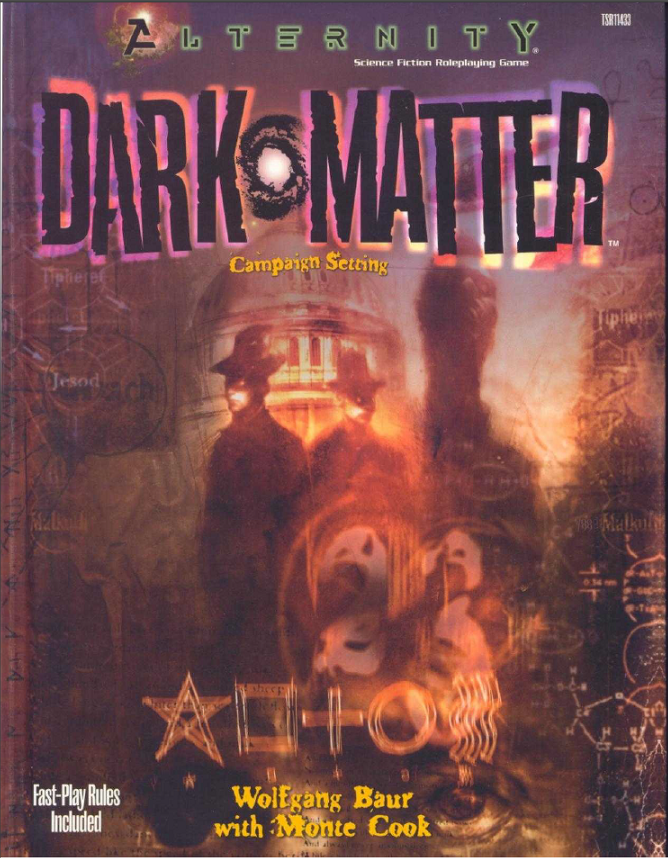 Welcome to Dark*Matter, a campaign setting for the Alternity Game System. Yes, that Alternity Game System, the one was developed towards the very rear end-end of TSR's reign and that commits the cardinal gaming sin of trying to do everything but managing to do none of it well, not even bothering to fail in a spectacular fashion. I believe the Alternity Game System was a proto-d20 SRD, in that it really does attempt to be a very generic, flexible set of rules onto which you can bolt any kind of theme or setting and wind up with a functional game. It used the classic six ability scores (boo) to derive secondary abilities in non-intuitive ways (hiss) with a set of bare-bones classes (piss) that unfolded into an extremely fiddly skill-based resolution system (poo poo) and include a bunch of poorly thought out mechanics that tried to integrate multiple disparate science fiction tropes - cyber gear and virtual reality hacking and mutations and psychic powers and starship combat - in a way that could have only been less intuitive if it involved differential equations (gently caress). Alternity's biggest crime was that it was completely uninspired and boring; although the game rules were functional, they failed to instill any sense of what sort of adventures you were actually supposed to play. Shadowrun in Space, or maybe Star Wars with Runners, is probably the closest coherent theme you could cobble from the core PC and DM handbooks. Maybe the best thing you can say about Alternity is that Brom did some pretty sick art pieces for the covers of most of the books, and provided a lot of memorable interior art as well (this is akin to saying the best off-brand microwave mac & cheese you ever ate was prepared for you by Gordon Ramsay). But for me, Dark*Matter is more than just the lame Alternity Game System onto which it was grafted. Dark*Matter was the first role playing game supplement that I could find as a teen that even hinted at darker subject matter than D&D or Star Wars. I grew up in a small town with no FLGS and only a single regional bookstore chain (Hastings, if you can recall it), and while the late 90's weren't lacking for games and gaming content that tripped all over their own dicks boasting about how dark and edgy and mature they were, those kinds of books didn't get a lot of play in the limited shelf real estate that Hastings would oblige to role playing games. I was well into high school before the internet was really a thing, so most of my role playing game knowledge was fragmentary bits and pieces that I could glean from random copies of InQuest magazine or from friend's older relatives who had played a game with people in another town. I knew that things like Call of Cthulhu, Deadlands, and V:tM existed, but there was no realistic way for me to get my hands on them. Hastings decided to carry the Alternity line, because it was a bare-bones sci-fi setting attached to a completely uninspired rule system, so when Dark*Matter launched in 1999, it slipped past whatever content review radar Hastings was using. As an adult, I can acknowledge that Dark*Matter is "subversive" and "dark" in the same way that The X-Files is "subversive" and the original Men In Black movie is "dark", but as a teenager without very much perspective Dark*Matter was mysterious and cool and it very lightly incorporated occult content - it was everything I thought I was missing in a role playing game. I'm reviewing Dark*Matter partly for nostalgia and partly to see if my teenage enthusiasm was completely misplaced, or whether there still might be salvageable ideas mixed in with the Alternity mechanics. Chapter 1: Everything You Know Is Wrong 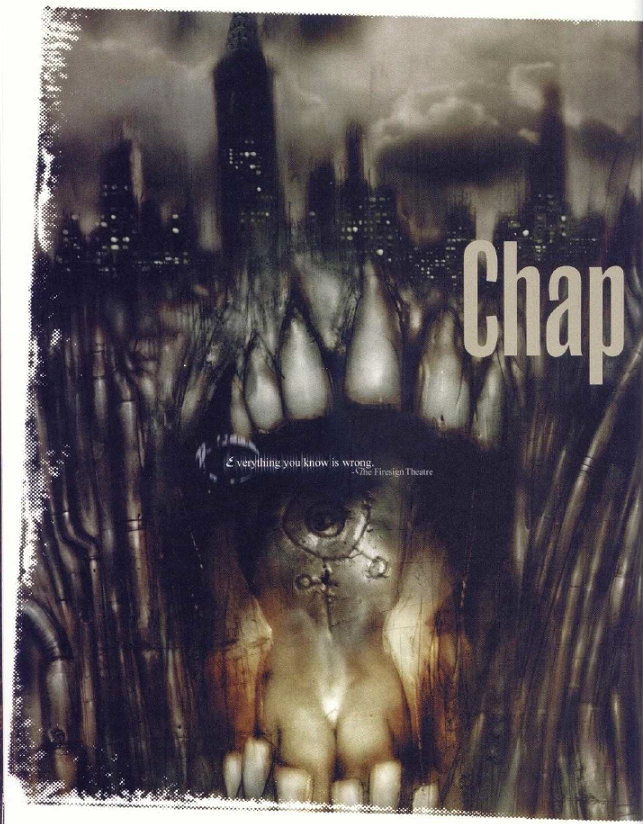 Matt Adelsperger gets credited for being the interior graphic designer, and I gotta compliment him; much of the art within the book is wayyyyyy better than the quality of the content with which it is paired. Chapter 1 is the stock-standard "What is a role playing game?" and while Dark*Matter provides a perfectly servicable explanation, it's not really anything worth remarking on - the players take on the role of regular people thrust into supernatural situations, with no training and even less understanding of what's really going on, and the GM sets up the scenarios and provides background flavor and plays all of the NPCs and arbitrates the rules and etc. It lays out the central premise behind the campaign setting, which is "What if every crazy conspiracy theory involving the Greys, the Illuminati, the Free Masons, and the Reptilians were simultaneously all true, and humanity's only chance for survival rests on your unprepared group of heroes". It's straightforward and introduces the general themes and setting of the game; Dark*Matter is more Delta Green than Call of Cthulhu. The main mechanical thing you need to know about Dark*Matter (and Alternity in general) is that the conflict resolution system is skill based d20 roll-under. It also incorporates non-binary success and failure states, which was a pretty significant departure from the legacy AD&D system that TSR had been using up to this point. If circumstances makes your skill check easier or harder, you assign applicable + bonuses or - penalties, and the sum of all bonuses and penalties becomes your situation die modifier. pre:Modifier Situation Die -------- ------------- +/- 5 +/- d12 +/- 4 +/- d10 +/- 3 +/- d8 +/- 2 +/- d6 +/- 1 +/- d4 Putting it all together, if your investigator has 10 Dexterity, the Ranged Weapons broad skill, and 2 ranks in the Assault Rifle specialty skill, to shoot your rifle you'd roll a d20 and your target numbers for Ordinary/Good/Amazing success would look like 12/6/3. If there was any Situation die, you'd roll that too and add or subtract that result from your d20 to get your final skill check score. That's all the relevant stuff for Chapter 1. There's an intro adventure that you can run some pre-made heroes through that I remember being not totally awful, but I think I'll save that til the end because there's another pre-made adventure at the end of the book, and the two of them kind of dovetail together if I am recalling correctly.
|
|
|
|
megane posted:Cover image is some generically spooky men with black hats and weird eyes, overlaid with the Sefirot, some random futhark and hieroglyphs, a DNA diagram, a couple of hydrocarbons, the number 23, and of course the Zener card symbols. Yyyep, got ourselves a 90s urban fantasy book here. in true 90's fashion, the book seems to have weird tonal issues too. further along, it really wants to start pulling into Kult-style violent occult stuff, but that gets lumped together with bigfoots and Reptilians and also they're all wizards and also maybe everything in the bible is literally true and and
|
|
|
|
marshmallow creep posted:"Sir Gui knew it was true love when his errantry brought him to Sasha, but when the wedding day came he never expected her old paramour Ivan "the Tankard" to make an appearance. Now it'll take all his gallantry and the grace of the Lady to make it through the night, so he can make it to the altar." nah, he just needs to find a ringer that can outdrink everyone else and will then take a dive in the 9th round because obviously the ringer doesn't want to get hitched. you could even make the ringer into not-Dane Cook from good luck chuck so that having to partner with him is almost worse than just losing the contest edit: oh poo poo or Charlie "how are you still standing bro? those cupcakes were full of horse tranquilizers?" *balancing on one foot with his eyes closed and karate chopping the air* "i know how to handle my sedatives . . . "
|
|
|
|
 Chapter 2: Welcome to the Hoffmann Institute  The standard Dark*Matter campaign assumes that the heroes are members or associates of the Hoffmann Institute (HI going forward), a private organization dedicated to investigating paranormal activities. Your players don't have to work for this group, but literally all of the player facing material and most of the GM behind-the-scenes info assumes that your group is working for HI, so much of the material as it is presented is fairly useless if you aren't going to play with this default assumption. HI was founded in 1917 with the goal of furthering scientific exploration for the human species. Over the course of the 20th Century, HI notices that the frequency of paranormal incidents is steadily rising, and the overall purpose and direction of HI switches track to accommodate this weird new world. HI doesn't want fame or notoriety for its actions and aggressively maintains a public persona of another boring corporate think tank that solicits grants and funding for innocuous and vague scientific research. Case in point, all of the HI sites and campuses are distinguished mostly by their low profile, they look like perfectly boring corporate office space in completely unremarkable commercial parks. As a matter of fact, HI keeps such a low profile that many people don't even realize they're being considered for employment until they're approached for their first mission. The source of where HI gets the necessary funding to run a trans-global conspiracy is something of an unknown even among the rank and file. On the outside, people just assume that HI is any other think tank and that they pursue grants and sell their services and etc. Agents on the inside know that's not entirely true, but agents that repeatedly try to nail down where the funding for equipment and travel and other expenses comes from get met with either uncomfortable silence or "temporary reassignment" to some HI post in the middle of nowhere (for some reason Branson, Missouri is a favorite punishment location). In reality, HI's funding comes from a vast network of government slush funds, riders on pork bills, contribution from CIA accounts that are strictly off-the-record, and even the United Nations provides a non-trivial portion of the annual budget. HI agents have infiltrated various support positions within the United Nations, and some members of the UN have been saved by HI's efforts and decided to pay them back. 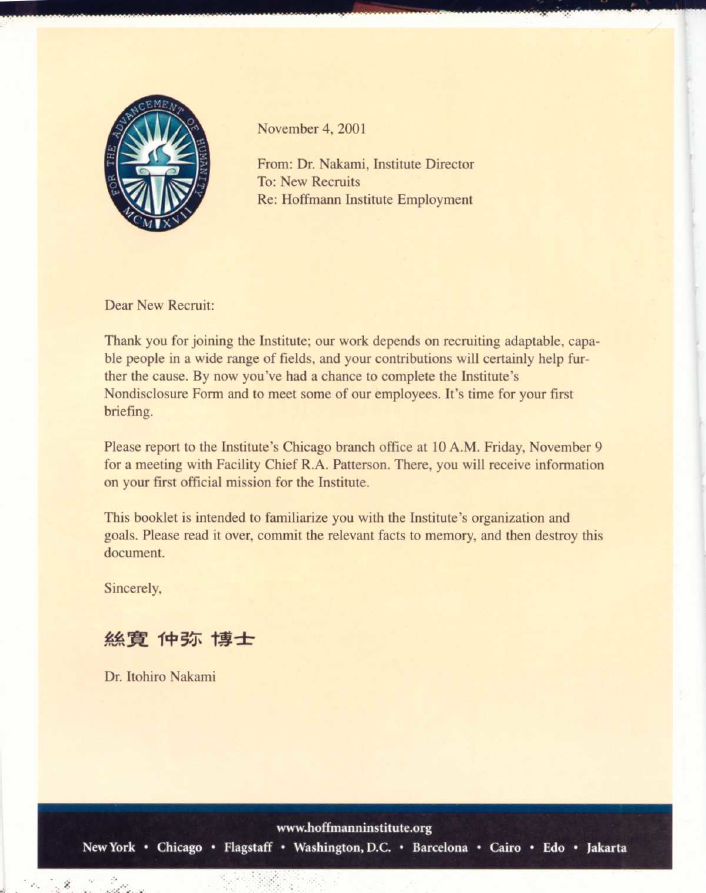 So how do you get a job offer from HI? They typically target specific individuals that have already had some kind of encounter with the paranormal and have survived through their own competence (or not). People that have manifested paranormal abilities, or encountered a monstrous creature, or experienced an alien abduction always make the top of the recruitment rosters. First, HI runs a complete background check on a potential recruit to get a feel for their muster. Felony convictions aren't necessarily a hard fail, especially if HI has a mission that requires someone with connections to underworld elements or other fringe groups. Often, HI just needs someone that won't completely lose their poo poo when things get weird. In general, HI just wants to make sure there's no glaring red flags in someone's personal history that could turn them into a liability for the institute. Assuming you pass the background check (and people that fail won't ever even know they were being considered) you get approached by an agent from the closest HI branch office requesting your assistance with a (relatively) minor task. They might see how cooperative you are when approached for some kind of specialized information or knowledge to which you have access, or ask you to perform very basic recon & surveillance, but they might also immediately put you on blast and ask you to shelter a wounded agent or help dispose of evidence because of your professional connections. Up to this point, the contact likely hasn't revealed that they work for HI; part of the test is gauging your reaction when asked to perform unusual tasks by unfamiliar people. Provided you successfully leap both those hurdles, HI will contact you in an official capacity and recruit you for a formal mission. In this case, you're going to be paired with 2 to 4 other initiates (wow, almost exactly the size of your average PC party!) and will have an official point of contact with an HI handler (weird, it's just like the relationship PCs have with their GM!) who will provide your group with a training mission that has a low potential for danger, like a milk run to produce some kind of basic research or information. Assuming your group doesn't poo poo the bed and performs the task to the satisfaction of their handler, you're all given official, written job offers. Potential new recruits that gently caress up this mission might get one more go around (depending on how badly they poo poo the bed the first time) but the book is adamant that nobody gets a third try. HI has an employee handbook that covers the expected rules of conduct. In general, agents are expected to keep their activities out of the public eye; HI isn't a real power player at the global level yet, and isn't even an official government sanctioned entity within the countries where it maintains campuses. HI is still also primarily oriented around research and investigation, which leaves them ill equipped to face down enemy organizations with a more militaristic bent. At the same time, all reasonable and good-faith efforts should be made to provide HI with clear, complete records, accounts, and documentation of unusual events. In practice, the good-faith clause has been interpreted by agents as permission to violate the law of the land as long as they keep HI's existence quiet. In the past, agents have used the good-faith clause to justify things like simple bribery, non-consensual psionic intrusions, trespassing, theft, extortion, and even murder. Although extreme actions are typically only sanctioned when HI is in danger of being exposed to its enemies, the recent attitude among the directors is that the situation on Earth is getting much worse and too quickly, and they're willing to give agents greater and greater leeway in how they complete a mission. Hierarchy 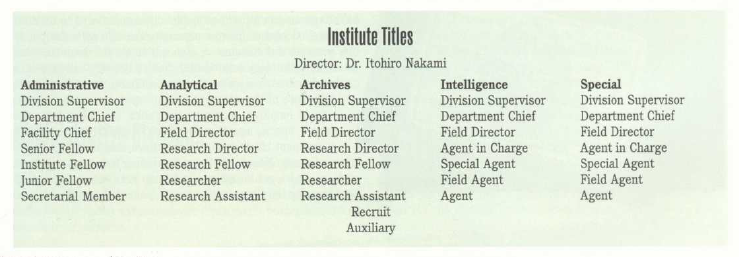 HI has an internal corporate hierarchy that's not unlike other quasi-military clandestine enterprises. I'm not going to list out all of the language for each rank because most of it is just filler and it's rarely going to come up in the course of a game. I will point out that HI Special Division operates their organization in cells, where the person at a given level knows exactly how many people report to him/her and how many additional people report to his/her subordinates, but the only up-stream interaction any given person has is with their direct report; any agent is also unlikely to know how many other agents of the same rank exist in parallel. In other words, an Agent in Charge knows all of the Special Agents, Field Agents, and Agents that report directly to him/her, but the Agent in Charge only knows who their Field Director is, and isn't likely to have information about any other Agents in Charge either. The Auxiliary rank include professionals that provide on-call or as-needed services to HI but aren't employees. They can't expect much from HI except for direct compensation for whatever task they're asked to do (no equipment requisitions, no training, no security clearance) but they're also much less likely to get targeted by another party looking to run espionage or take revenge against HI. Security Clearances Nothing exciting here. HI ranks clearance levels as Public, Confidential, Classified, Secret, Top Secret, and Eyes Only. Your ability to request sensitive information roughly rises as you climb the HI hierarchy, although Eyes-Only info contains items so sensitive that your request won't even be considered unless another employee of your rank or higher co-signs the request. Institute Site Security  There's several paragraphs that go into intricate detail about the general security level of HI campuses, but it all boils down to: HI site security is top of the line, using the highest quality contemporary security mechanisms as well as several that have been "borrowed" from alien tech or supernatural events. HI even has a rudimentary AI that links all of the major HI campuses together named OSIRS (but supposedly everyone pronounces it like Osiris). The AI is rudimentary right now, but only the directors at the top of the hierarchy know where it came from, and the GM is free to develop OSIRS as much or as little as the campaign needs. Is OSIRS a damaged AI that was recovered from an alien vessel, or a supernatural intelligence that masquerades as software? Who knows? In true RPG fashion, HI security is rock solid until it isn't; the GM is encouraged not to worry about the logistics too hard if they need an enemy force to infiltrate or compromise a location. Compensation & Benefits Entry level agents can expect to earn roughly $48k/yr, with the possibility of bonus income or merit increases if they perform a mission particularly well or recover alien technology or etc. As you move up the ranks, HI employees have the potential to steadily increase their salary, with Department Chiefs and above making low to mid six figure salaries; accordingly positions near the top of the hierarchy have extremely low levels of turnover. HI employees are offered fairly generous retirement packages, but the catch is that very few employees live long enough to cash in those benefits; agents tend to die young. HI also offers skilled trainers and coaches for almost any broad or specialty skill you'd like to have your hero learn, at least up to rank 3. HI specifically trains all of their employees in the Unarmed Attack, Ranged Weapons, and Investigate broad skills, and if you join the agency without proficiency in those skills, they'll be the first things you learn. HI also retains with legal services of Marshall, Wickham, and Vanderdossen to provide legal advice and services to institute operatives. The firm is renowned for getting cases to settle out of court, in no small part because the lawyers employed by the firm aren't afraid to utilize bribery, extortion, and other unsavory negotiating tactics, as long as they can maintain legal plausible deniability. Marshall, Wickham, and Vanderdossen are well versed in extricating agents from jails and getting records expunged, but it doesn't happen overnight, so agents are advised to do their very best to stay under the radar of police or other authorities and keep their asses out of jail in the first place. Marshall, Wickham, and Vanderdossen aren't foolish; they'll defend an agent as a client of HI to the best of their abilities, but they're not afraid to decline representing agents that become repeat offenders, or agents that committed brazen crimes that don't leave their culpability within a reasonable amount of doubt. Come back next time for Chapter 3: Institute Divisions, Agents Careers, Skills, Perks, and Flaws! Freaking Crumbum fucked around with this message at 00:03 on Sep 4, 2017 |
|
|
|
Evil Mastermind posted:It's both. You get the impression that they couldn't decide if they wanted to go "dark underworld of every reality" or "Hollow Earth" and decided to sort of split the difference. There are, in fact, molemen, but they barely get a page of info. your intro description seemed like it was kind of taking a turn into silent hill / saw / human centipede style horror Evil Mastermind posted:A Storm Knight in Nippon Tech evades his pursuers by running into old forgotten subway stations. In his rush, he doesn't realize how far underground the stairs and stations go...until he finds himself in a rusty sub-basement that seems like it's been abandoned for decades, except for the fresh blood on the walls. I'm not sure if your description was you embellishing, or if it was actually printed that way, but I'd rather see that than just "the living lands, but marginally less inimical to ever having an adventure there" I know orrosh is supposed to be the overt horror themed cosm but bram stoker / mary shelly / et al style Victorian horror doesn't do it for me edit: a cosm that operates entirely like a silent hill 2 "other world" where the part of earth it invades doesn't look outwardly different, but there's this sinister mirror universe that you can cross into without even realizing it would be loving sweet. I feel like all the cosms are so on-the-nose, having one that wasn't immediately apparent how hosed-up things were would be an interesting change of pace Freaking Crumbum fucked around with this message at 21:10 on Sep 6, 2017 |
|
|
|
Mors Rattus posted:IMO horror is just stupid hard in RPGs in general and impossible in poo poo like TORG. oh for sure, I just meant that if TORG was absolutely going to have a horror themed cosm, consequences be damned, the van helsing style Victorian horror takes way more effort for me to suspend my disbelief than more contemporary horror genres. I think it's because vampires and werewolves and zombies and demons are so ubiquitous in our fictional settings that they fail to evoke the desired response at all. for me it's hard to pretend to be afraid of fighting another dracula, but it's a lot easier to be creeped out by silent hill style wrongness.
|
|
|
|
Young Freud posted:Or maybe merged into the Tharkold and become some sort of cyberdungeon megastructure like in Megumi Tensei or BLAME! in an ironic twist, the darkness devices decided that tharkold's "hell" would be the platonic ideal of heaven, with angelic choirs and pearly gates and you literally can't inflict violence against any other entities and there's no more rape slaves and everything is just sublime
|
|
|
|
Evil Mastermind posted:Sadly, Land Below came out before Tharkold, so heaven will not be a place on Core Earth.
|
|
|
|
 Chapter 2: Welcome to the Hoffmann Institute Part 2  Okay I lied, it turns out the internal division listings for the Hoffman Institute are a lot more information dense than I remember, and I don't want to run this into Chapter 3 (which is its own kind of info-dense beast). So, let's knock this out tonight! HI has five primary divisions, each responsible for a different aspect of HI's overall goals. The divisions are: Administrative, Analytical, Archives, Intelligence, and Special. Most divisions have a presence in each of HI's branch offices, although this presence can sometimes be just a single agent at some of the smaller facilities. Each division is centered in a different city or compound, and many divisions are further divided into smaller departments. Director Itohiro Nakami leads the Administrative Council, a group of HI executives responsible for setting and reviewing the primary goals for HI, as well as keeping said goals away from public scrutiny. The other members of this council are the five Division Supervisors (the highest rank within a given division), the multiple Department Chiefs within the Administrative division, and any additional Facility Directors that might have control of particularly sensitive or crucial intelligence within their compounds. Administrative Division Division Supervisor: Gail Morland Gail is the most senior HI agent, outranked only by Director Nakami. Because of her position of seniority and her role as division supervisor of administration, there's not much information that slips by her notice. She doesn't necessarily know all of the specific details of every operation as they occur, but you can infer a lot of critical information just by auditing an agent's expense records and equipment requisition checklist. This is the division that makes HI policy, assigns agents to specific tasks, and authorizes the use of force when it becomes necessary to the completion of a mission. More frequently, however, this division includes the bean counters and support resources that make sure HI stays under budget and on target. Administrative Division departments include Facilities & Accounts, Legal, Personnel, Security, and Training. The book is pretty direct that the Administrative Division isn't the best base of operations for the kinds of adventures that the average HI agent is expected to undertake, but if you have a player that really wants to play a fish-out-of-water getting thrown into action because of an internal miscommunication, go hog wild. In general, Administrative Division does not retain a stable of field agents, and they are almost never involved in direct operational capacity. This has also created an unfortunate rift between the Administrative Division and the Intelligence division, as the latter group tends to involve the majority of HI's active field operations, and agents that risk their lives day in and day out have become understandably tired of having to justify why (for example) an AR-15, 3 boxes of ammunition, and two incendiary grenades was necessary to complete their operation when they were already provided a standard issue 9mm with a single spare clip. Analytical Division Division Supervisor: Thomas "Too Tall" Curran Too Tall was a former chief medical examiner for the city of Dallas until he ended up unknowingly performing autopsies on xenoforms that only superficially resembled human beings. He still affects a southern accent and puts on a "been there, seen it all" attitude that serves to counterbalance his gaggle of excitable but easily distracted subordinates. The brains of HI, this division is half research methodology and half applied engineering, with a big 'ol helping of nerd mixed in for flavor. Analytical Division departments include Ballistics, Biological & Chemical, Computer Resources, and Engineering & Fabrication. Almost every agent in this division possesses some extremely specific technical expertise or scientific skills, and they are often expected to be able to bring their knowledge into the field to assist other agents in identifying or resolving supernatural phenomena. One of Alternity's character classes is the Tech-Op, and the book recommends that any players wanting to run a Tech-Op hero should start in the Analytical Division. Archives Division Division Supervisor: Gheorghe Zamfirescu Gheorghe oversees all of the data, research reporting, patents, and classified information produced by HI. Although field agents flippantly refer to the Archives Division as "the clerks" and refer to Gheorghe as "the Head Librarian", agents quickly learn that saying either of those things within earshot of Archives personnel is a great way to get all of your system access revoked and all of your digital devices recalled for "maintenance" . Archives Division oversees a wide-ranging collection of human and alien artifacts, occult tomes, and xenobiological specimen samples, widely scattered across multiple HI sites; this is an intentional policy to enhance division security and ensure that a breach at any one Archives Division compound doesn't risk compromising the entire institute. The Archives Division departments include the Department of Antiquities and the Department of Documentation. Four of the most important Archives Division branches are the Case Report Server (containing redundant digital copies of all HI case files), the New York Rare Book Depository (the Ry'leh Fragments, a copy of the stage play "The King in Yellow", etc.), the Chicago Specimen Collection (primary repository of the institute's xenobiological specimens), and the Barcelona Antiquities Office (archaeological finds like the Ark of the Covenant). Despite the negative connotations that many field agents ascribe to the Archives Division, it's not at all uncommon for Archives Division agents to perform on-site work for active operations. If your character concept includes someone like Indiana Jones or Lara Croft, the Analytical Division makes a great base of operations. Intelligence Division Division Supervisor: Samuel Layacona Sam operates the Intelligence Division out of Washinton D.C. where the division has multiple opportunities to work with, and recruit from, agencies such as the CIA, DoD, FBI, and NSA. Sam actually started as an agent for the NSA under the Carter Administration, and although he has long since ceased working for the U.S. government, he has maintained an extremely "scratch my back and I'll scratch yours" relationship with his previous colleagues. The Intelligence Division departments include Directorate, Image Acquisition, Observation, and Information Retrieval. These departments cover all of the standard cloak and dagger activities that comprise the deadly ballet of international espionage. The Directorate department itself is shrouded in secrecy; other agents claim that it consists of 12 spooks that aren't listed anywhere within the HI employee hierarchy, that they operate from a secured compound somewhere in Scotland, and that they keep tabs and files on both HI's enemies and HI's agents. When an HI agent goes AWOL or rogue or worse, the Directorate is the department that's responsible for cleaning up the mess. Thus far, nobody that has ever turned traitor against HI has permanently avoided capture or execution by the Directorate. Special Division Division Supervisor: Unacknowledged The Special Division is to the Directorate what the Directorate is to the rest of the institute. HI makes no effort to publicize the existence of Special Division; HI officers and supervisors don't acknowledge it, and its members never appear on an organizational chart, phone list, or employee database. In fact, most Special Division agents are hidden in plain sight, holding otherwise unremarkable positions within other HI divisions, but following an invisible chain of command of which only they are aware. Still, stories of Special Division activities regularly make the rounds among the rest of the HI staff. If even half of the rumors are true, the Special Division is a hotbed of paranormal activity, supernatural encounters, and xenobiological monstrosities. Everyone "knows" that the Special Division is home to the HI stable of honest-to-god psychics, engages in black ops and wet work assassinations, and has possession of the sole operational, intergalactic vehicle that Special Division remanded from a wayward alien scouting party. If any of the regular HI staff were told what actually happens within the Special Division they'd say such lies are too outlandish even for the average weirdness that comes from working at HI. The book promotes the idea that the Special Division is the "epic level" version of a Dark*Matter campaign. When your players have saved the world from the brink of annihilation, that's when they get an invitation to the Special Division to learn what's really going on. With that, we're finally done with Chapter 2! The next chapter is a lot more dry; it's the skill list and feat list and career list for Dark*Matter heroes. Rather than cover all of the mechanical information line-by-line, I'm going to use it to try and explain what I perceive to be one of the major shortcomings of the Alternity system.
|
|
|
|
 Chapter 3: Heroes of Dark*Matter 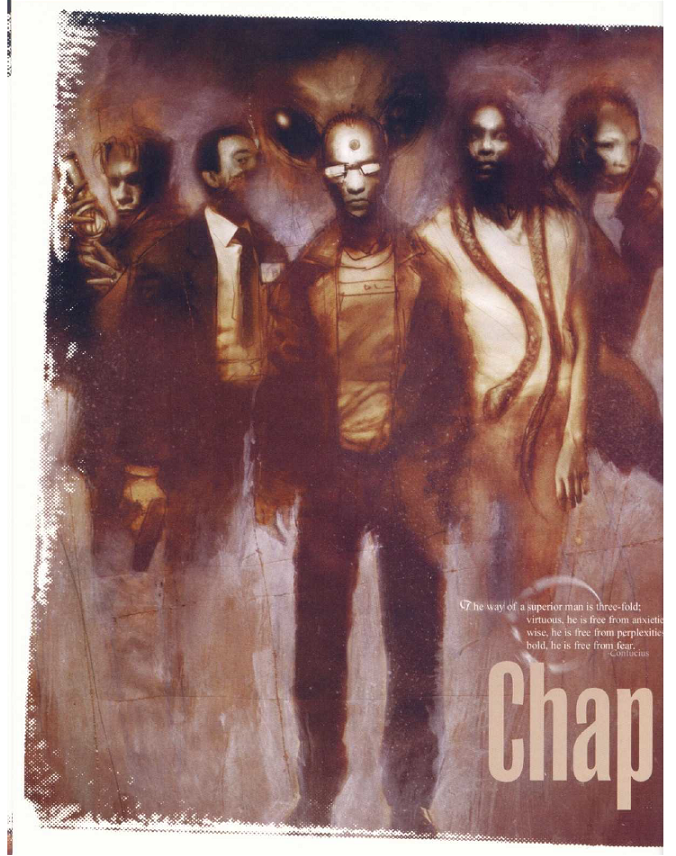 Chapter 3 is the standard Skills / Perks & Flaws / Careers / etc. chapter that is included in every campaign book that gives your players more options for character creation that are Alternity's conflict resolution system is Skill-based d20 roll-under. It also incorporates non-binary success and failure states; you can Fail or Succeed, and your Success can be Marginal, Orginary, Good, or Amazing. Circumstances that make your skill check easier or harder are assigned applicable Bonuses or Penalties, and the sum of all bonuses and penalties becomes your situation die modifier. The most un-intuitive part for new players is that Bonuses subtract from your roll and Penalties add to your roll, because this is a roll-under system which means golf rules apply. To attempt an action, you roll d20 +/- Situation Die. pre:Modifier Situation Die -------- ------------- +/- 5 +/- d12 +/- 4 +/- d10 +/- 3 +/- d8 +/- 2 +/- d6 +/- 1 +/- d4 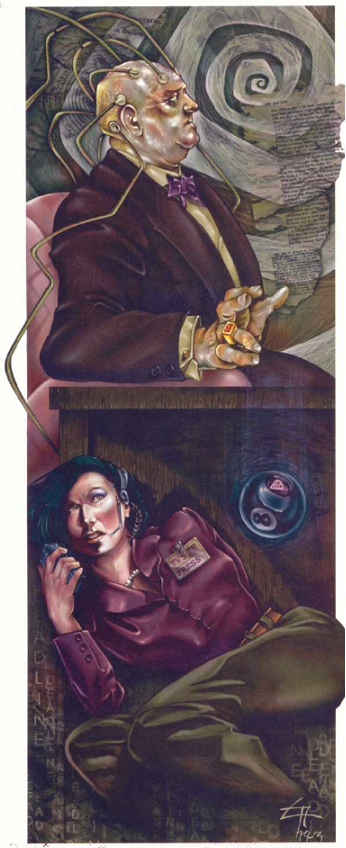 Most of the art for this chapter is paired with skill descriptions on the same page, and frequently my brain can't parse the connection. This is Creativity and Investigate? SKILLS: In order to determine whether or not you succeeded at doing a thing, you compare your final modified roll to your skill rank. Skill Rank can be two different sets of numbers, depending on whether you're using a Broad Skill or a Specialty Skill. Broad Skills are the generic skill umbrellas that cover basic knowledge about a thing (Ranged Weapons) and a skill check against a Broad Skill uses an Ordinary/Good/Amazing scale equal to Base Attribute / BA/2 / BA/4 (always dropping any decimals). You fail if your skill check result is greater than your Base Attribute. Specialty Skills are the specialized knowledge you have about a specific thing within a Broad Skill category (Ranged Weapons - Assault Rifles) and a skill check against a Specialty Skill adds your ranks in the Specialty skill to your Base Attribute before dividing, so a skill check against a Specialty Skill uses an Ordinary/Good/Amazing scale equal to Base Attribute + Rank / (BA+R)/2 / (BA+R)/4 (always dropping any decimals). You fail if your skill check result is greater than your Base Attribute + Rank. This means that you can buy multiple ranks of the same Specialty Skill to improve your odds of success, and many Specialty Skills also offer Rank Benefits past certain skill level thresholds. Rank Benefits have to be bought separately, meaning you don't get them automatically for passing the required Specialty Skill level threshold. You have to specifically buy the same rank again for the same cost, and they give your character some additional stunt they can do with the skill. Putting it all together, if your HI field agent has 10 Dexterity, the Ranged Weapons broad skill, and 2 ranks in the Assault Rifle specialty skill, to shoot your AR-15 at a feral mothman, you'd roll a d20 and your target numbers for Ordinary/Good/Amazing success would look like 12/6/3. If there was any Situation die, you'd roll that too and add or subtract that result from your d20 to get your final skill check score. 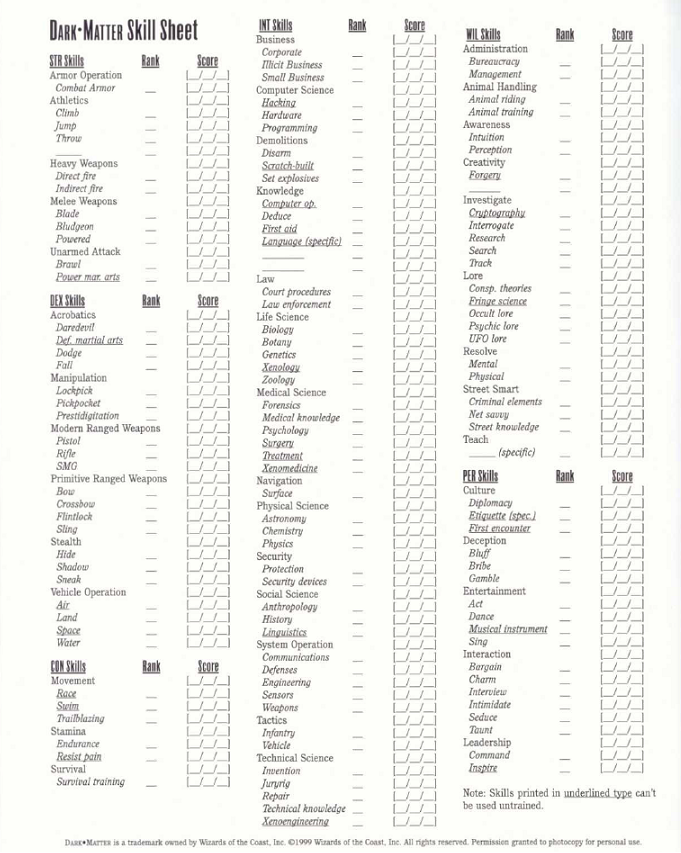 Look upon my bloat, ye mighty, and despair! So what's my beef with the system? 1. The full skill list (see above) is wayyyyyy too bloated and convoluted. It disproportionately favors Dexterity and Intelligence for the bulk of the skill sheet, meaning any character that doesn't invest in those two base attributes are objectively less effective (and hence less fun to play) than a character that does invest in those two base attributes. God stats ahoy! 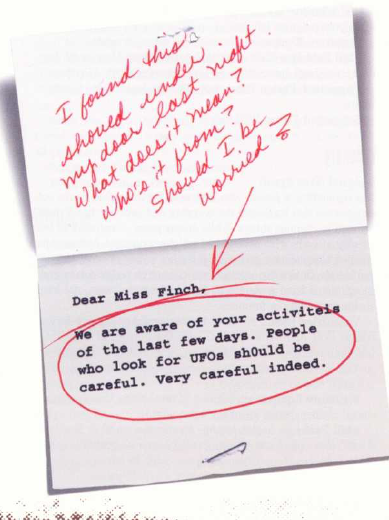 Journalism? 2. There's too many skills that have overlapping use, either RAW or RAI, and there's too many chances for a player to purchase the "worse" version of two nearly identical skills, Unless they're willing to memorize not only the literal skill definition for every possible Broad and Specialty Skill, but also possess encyclopedic knowledge of how each different monster or threat or hazard or obstacle interprets the skill list.
Why does the act of moving stealthily take three different skills? Why aren't Dexterity: Stealth - Hide and Dexterity: Stealth - Shadow and Dexterity: Stealth - Sneak just one single skill? Why are Intelligence: Computer Science - Programming and Intelligence: Knowledge - Computer Operations and Intelligence: Technical Science - Technical Knowledge three disparate entries? There's no commonality between these skills that might preclude just putting all of them into one skill? For that matter, what kind of information is too specific for Intelligence: Technical Science, to cover it, such that Intelligence: Technical Science - Technical Knowledge needs to exist to keep things from getting out of hand? Why does Intelligence: Technical Science get Invention but not Will: Creativity? Doesn't inventing things require some degree of creativity, and vice versa? Why does Personality: get 4 broad skills and 14 (!) Specialty Skills that are all just synonyms for verbally convincing to do something for you? Personality: Convince - Verbally could coexist along with Strength: Coerce - Physically and it'd make just as much sense and take up 1/7 the space.  Life Science and Medical Science? 3. Because of the aforementioned bloat there's a frustrating lack of consistency, even between Alternity designers, regarding which skills should be used for which purpose. Sometimes, even within the same adventure, you would have extremely similar situations that arbitrarily use two different skills to resolve them. Some examples:
What if I need to swim away from a shark that's trying to eat me in the ocean? Am I using Constitution: Movement - Swim because I intend to swim through the water, or am I using Constitution: Movement - Race because I am racing the shark to my boat/dry land/safety? What if I have to resist torture? Do I roll Constitution: Stamina - Resist Pain or Will: Resolve - Physical Resolve? When do I use Intelligence: Knowledge - Deduce versus Will: Awareness - Intuition? What is meaningfully different between these skills?  Militiaman? Maybe. Street Punk? Uhhhhh? 4. Rank Benefits are either completely underwhelming or gate off skill functionality that should really just come with the core Specialty skill. Rather than giving your character some extra, cool, unique thing to do, they're just the prototype for the D&D 3.X / Pathfinder school of design; Rank Benefits are used primarily to reduce or remove the penalties for trying to use your skill for something it should already cover.
Want to be able to dodge incoming gunfire and try to return a little heat yourself? Too bad! You can't both dodge an attack and take any other action until you've bought 3 ranks in Dexterity: Acrobatics - Dodge and then bought rank 3 again. You also can't declare that you're using your action to dodge an attack if it happens before your initiative until you've bought 7 ranks in Dexterity: Acrobatics - Dodge and then bought rank 7 again. What an interesting way to make sure low level combat is extra lethal! Want to draw your pistol and shoot it with the same action? You're going to get an action penalty for that, unless you have Dexterity: Ranged Weapon - Pistol at 3 ranks and you also bought rank 3 again. Want to use any other weapon in the same action that you drew it? LOL, buy up to rank 3, plus rank 3 again, for each type of weapon with which you might want to have this functionality. I don't even know if it would have been worse to just make Dexterity: Ranged Weapon - Quick Draw its own skill; on the one hand, skill bloat, but on the other, it's really silly to have to buy this specific Rank Benefit for EACH type of weapon you use. 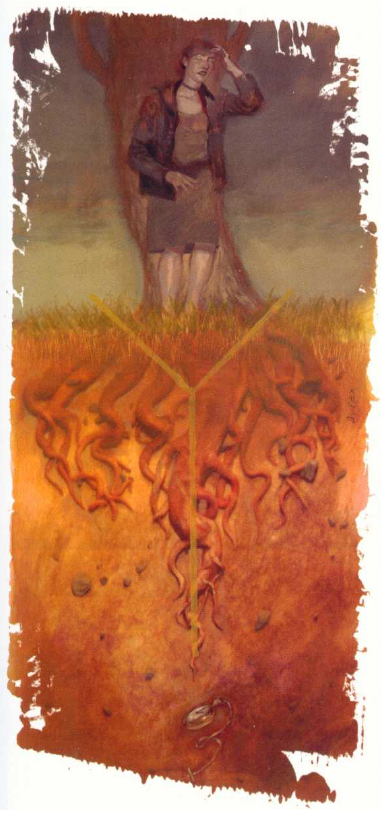 Investigate? PERKS & FLAWS: No surprises here; if you've seen one game's Perks & Flaws section, you've seen them all. Like every other game, these can be bought either at character creation or with experience points earned from advancement. Their practical use is to min/max some specific character concept with a bunch of drawbacks that contain an extremely fatal degree of punishment but are also miraculously paired with an exceedingly infrequent chance of ever coming up over the course of an adventure. You know, gaming the maximum number of points out of the character creation system. Most of these are pretty boring - get a minor bonus to this skill or take a penalty when this specific thing occurs, but I'll highlight a few that are notable: High Tech Your hero starts the campaign with one fully functional alien/futuristic/occult/etc. item or weapon. This is the D&D equivalent of starting a level 1 hero with a magic item of his/her choosing. The perk specifically says the item doesn't have any drawbacks or hidden penalties and will work flawlessly unless your hero gets a Critical Failure result on a skill check when using this item, whereupon it will break (Alternity does Critical Failures on any natural 20 rolled, so there's a 5% chance this will happen every time the item is used). All this for the low cost of 4 experience points, about the same as a broad skill or the first rank in a specialty skill; in other words, this is so cheap that there's literally no reason every starting hero shouldn't have this, and shouldn't be paying to replace it whenever their current magic item breaks. Networked A Perk with a vague mechanical explanation that grinds the game to a halt for everyone else while you resolve a game of Mother May I? with the GM. You gain a -1 bonus any time you use a contact or allegiance. How do you "use" a contact or allegiance?  There's no specific Allegiance Specialty Skill, and the only other mechanical use of the term Allegiance is for Alternity's version of alignment - essentially you have 3 descriptive phrases you can pick out for your character at creation (for example, you can be Brave, or be a Law Enforcement Official, or love Punk Rock Music), and when you're dealing with NPCs with similar Allegiance the GM is supposed to give you more favorable interactions. This gives you a -1 bonus on top of that (?) so I guess the GM has to somehow convey that your NPC interaction is going better-1. There's no specific Allegiance Specialty Skill, and the only other mechanical use of the term Allegiance is for Alternity's version of alignment - essentially you have 3 descriptive phrases you can pick out for your character at creation (for example, you can be Brave, or be a Law Enforcement Official, or love Punk Rock Music), and when you're dealing with NPCs with similar Allegiance the GM is supposed to give you more favorable interactions. This gives you a -1 bonus on top of that (?) so I guess the GM has to somehow convey that your NPC interaction is going better-1.Well Traveled Any time you visit a new location for the first time, you can try to "remember" an NPC that your character knows at this occult conspiracy/alien mothership/yeti sex dungeon/etc. by making a basic Personality check. Succeed, and you get to make up an NPC that offers you some kind of minimal assistance. Fail, and it turns out the person you remembered was a jilted ex-lover (or someone else you pissed off for some reason) and instead they're an additional obstacle for your team until you leave the area. Nothing like a perk that can also randomly penalize you! This is also something that seems like a good GM would just allow any player to do at any time following the rule-of-cool, but Alternity isn't one of those dirty story games. 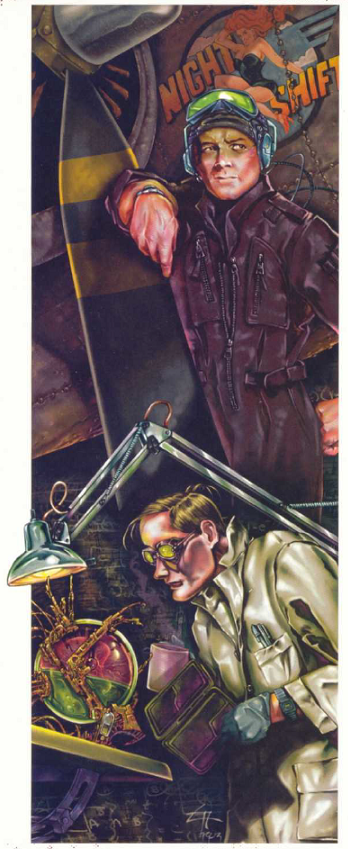 At least these two people could conceivably be a Field Guide and a Doctor. CAREERS Alternity has a vestigial class system with four very loosely defined classes (Combat Specialist, Diplomat, Free Agent, and Technical Operative) that provide some minor bonuses to a first level character and broadly impact how much certain skills cost to purchase. Since the base class system is so minimalist, the Careers section is basically several pages of imagination fuel for players that are having a hard time wrapping their heads around which skills they should use for a given character concept (because again, there's no mechanical difference between a Solider and a Police Officer and a Militiaman and a MMA World Champion - they're all fall under the same Combat Specialist class umbrella). Each career is just a short blurb about what that type of profession would be doing in a Dark*Matter campaign and includes a list of recommended skills and perks and flaws for a new character to buy. There's no mechanical benefit to being one type of Free Agent versus another type of Free Agent, so I'm not going to transcribe any of the suggested careers here. If you can imagine what kind of skills a Private Detective should buy, then you're already too competent too need this section. BOOM! Chapter 3 done! Next time we roll into Chapter 4, all of the occult mysteries that plague the world of Dark*Matter! This is somehow just another 20 pages of Broad Skills and Specialty Skills 
Freaking Crumbum fucked around with this message at 06:07 on Sep 17, 2017 |
|
|
|
Dareon posted:If those skills include supernatural functionality, some of that art makes more sense, like that one lady using Investigate to dowse for a lost watch. that would be a pretty cool twist on an otherwise pointlessly bloated skill system! unfortunately, that would require way more creative thinking than Alternity is capable of handling. Investigate only includes mundane methods of finding out information. HOWEVER! There is a psychic power listed in the next chapter that does include finding missing objects via dowsing. This is gated behind yet another Broad Skill/Specialty Skill list and also incorporates elements of finite resource management, because nothing says good game design like multiple arbitrary hurdles to playing interesting characters!
|
|
|
|
Leraika posted:
Alien Rope Burn posted:Here's Moonte Cook: tbh I'm blown away that neither of these guys looks like a real-life version of the comic book guy from the simpsons. any time I ever imagine what somebody involved in trad games as a business looks like, it's always comic book guy. or maybe the guy that does the art for penny arcade because I recall seeing him on some old 4E D&D webisode thing and he also looked like he was wider than he was tall.
|
|
|
|
 Chapter 4: Arcana - Psionics 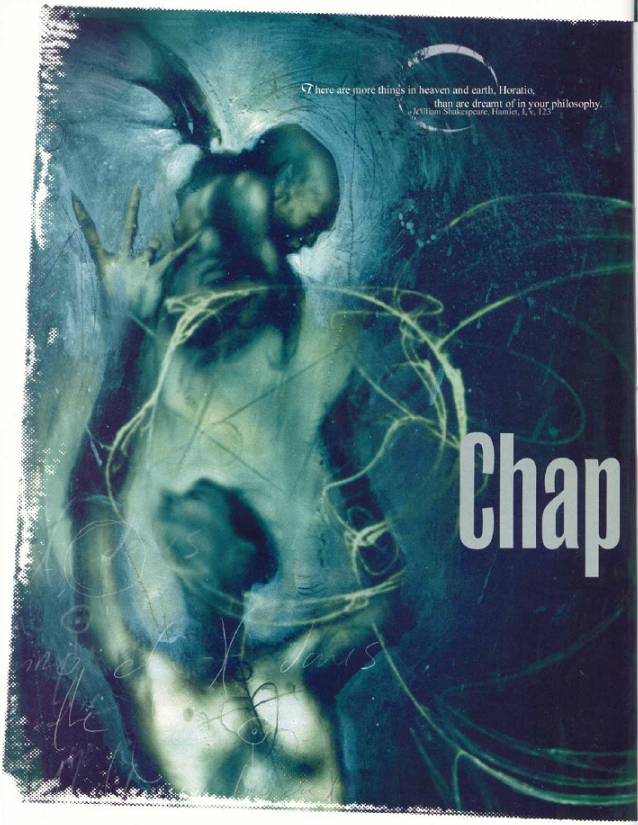 Chapter 4 is the obligatory chapter about psychic powers, sorcery, and divine magic. More than that; it's really boring. Perfunctory? Uninspired? The rules make sense, and Dark*Matter is basically just making slight adjustments to the rules for psychic abilities and supernatural powers that were already presented in the core Alternity PHB. There are some slight twists to make the powers more thematic for Dark*Matter and there's a few new powers, or new uses for powers, provided as well, but on the whole I don't feel like Dark*Matter does anything very interesting with the supernatural as a concept. A long, long time ago, I reviewed the AD&D Complete Psionics Handbook for a prior iteration of FATAL & Friends. I mention this because Dark*Matter is another TSR game, and I feel like it largely makes the same mistakes. Much like psychic powers in AD&D, the supernatural powers presented in Chapter 4 feel like an afterthought, like they were bolted on because the game is Dark*Matter and it's supposed to be a Cthulhu knock-off, but with no real care or interest taken to make anything exciting or mysterious. The supernatural powers provided work basically the same way as every other Broad Skill+Specialty skill pairing that you would normally buy for your hero. However, they also require that you involve a separate power source - either Psychic Points for psychic powers or FX Points for supernatural powers. I guess the concern was that these kinds of spells and powers would just be totally unbalancing if you could use them as freely as, say, Intelligence: Knowledge - Deduce? One of the major limiting factors is that the powers just don't scale well - if you compare the amount of XP that it takes to learn how to shoot a regular gun, and compare that to the amount of XP that it takes to learn some kind of attack psychic power, it actually requires more XP spent just to get the psychic power to the same level of proficiency. On top of that, you're completely locked into using only that psychic power, whereas learning how to shoot a gun gives you a diverse array of combat options (Dark*Matter produced an entire splatbook for gear-porn that I might cover in the future, but suffice to say there's multiple-page-long charts that specify exactly what the mechanical difference is between every conceivable type of ammunition, so they were thorough if nothing else). Beyond that, it's much easier to find better weapons, or weapons that target a specific kind of defense, so that the Pavlovian item treadmill kicks in and gives your players a sense of progression. The same thing just doesn't happen with the psychic or supernatural powers - they can get Rank Benefits just like other Specialty Skills, but even if you go out of your way to buy all of them, they still aren't competitive with regular skills. But enough belaboring the point, let's jump right in! 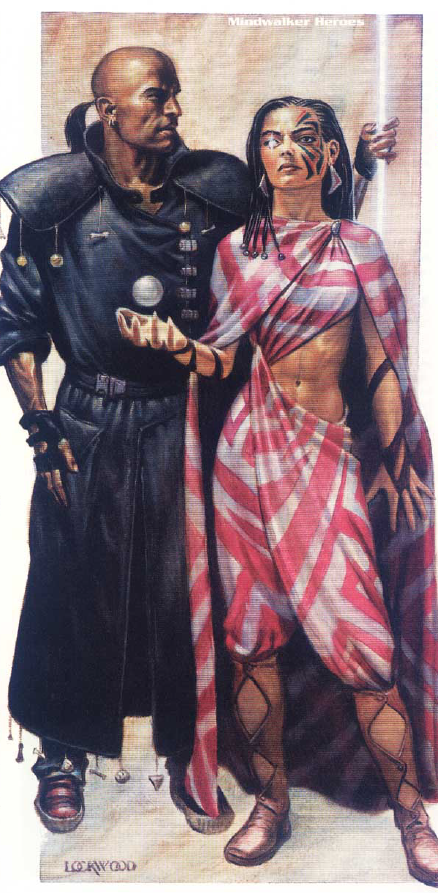 The section for psychic powers doesn't have a lot of art, so I'm spicing it up with Mindwalker art from the Alternity PHB. Here's what your Mindwalker hero might look like if you weren't playing Dark*Matter. Mindwalking (Psychic Powers) In core Alternity, Mindwalker is a basic class like Combat Specialist or Tech Op. As Dark*Matter is set in the year 199X, humanity hasn't yet mastered all of the techniques required for Mindwalker to be an actual class that a player can take. Instead, players are allowed to purchase one Mindwalking Broad Skill and up to two related Specialty Skills, and the Specialty Skills also have a maximum hard cap - your first Mindwalking Specialty Skill can reach a maximum rank of 12 and your second one can reach a maximum rank of 6. Any player that buys Mindwalking skills automatically gets a reserve of Psychic Points equal to 1/2 their Willpower ability, rounding down (making these options even less appealing to characters that don't pump Willpower). You can raise your Psychic Point pool by spending XP similar to raising a skill, but you can only ever purchase 3 additional Psychic Points - this means that the most willful possible character that buys all 3 Psychic Point pool upgrades will only ever have 10 Psychic Points. Intelligence: ESP - Empathy normally grants your hero a bonus towards social interactions based on the quality of success you roll. Dark*Matter adds the ability to Read Auras, and doing so also gives you a bonus towards any medical or first-aid related skill checks you make on the target. Tell me where it hurts! Intelligence: ESP - Mind Reading allows your hero to read someone else's surface thoughts. Dark*Matter adds the ability to probe a target's mind for some specific piece of information or memory. Honestly, I have no idea why this wasn't a core feature of the original ability. Intelligence: ESP - Psycholocation is dowsing. That's all, you use this power and you hold a special stick and your hero can find things that are missing. Intelligence: ESP - Sensitivity normally is a radar system that lets you know when someone else is using psychic powers. Dark*Matter includes functionality for talking to ghosts as a Medium, although ghosts are a cowardly, superstitous lot and the information they give is likely wrong. This is in the skill description, which makes me wonder why they even bothered. Hey, here's a skill that will give you bad information on a successful roll! 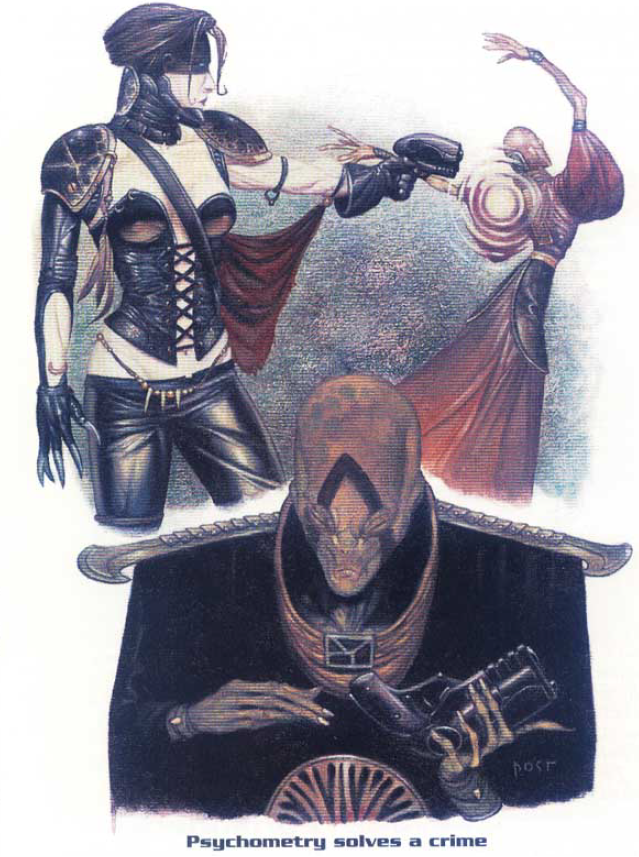 Psychometry solves the crime of Future Marlyn Manson disinterestedly shooting an orb at some kind of brown locust that's way over-selling the severity of the crime. Will: Telekinesis - Electrokinetics was a basic bitch direct damage blast in Alternity core (seriously, it couldn't even deal mortal damage on an amazing success) and Dark*Matter actually gives it some pretty cool utility functionality. It can now also be used to wipe data off electronic media, tamper with or fool electronic sensors like bio-metric screens, completely bypass any kind of electronic locking mechanism, and jam radio or microwave or cellular or wireless signals within a given area. Will: Telekinesis - Psychokinetics is moving stuff with you mind (what you'd typically associate with telekinesis). Dark*Matter allows you to attempt fine motor control with your psychokinetics so that you can pick a lock or shoot a gun or whatever. Again, I have no idea why this wouldn't have been included in the original functionality, but I guess it's nice they decided to include it here. 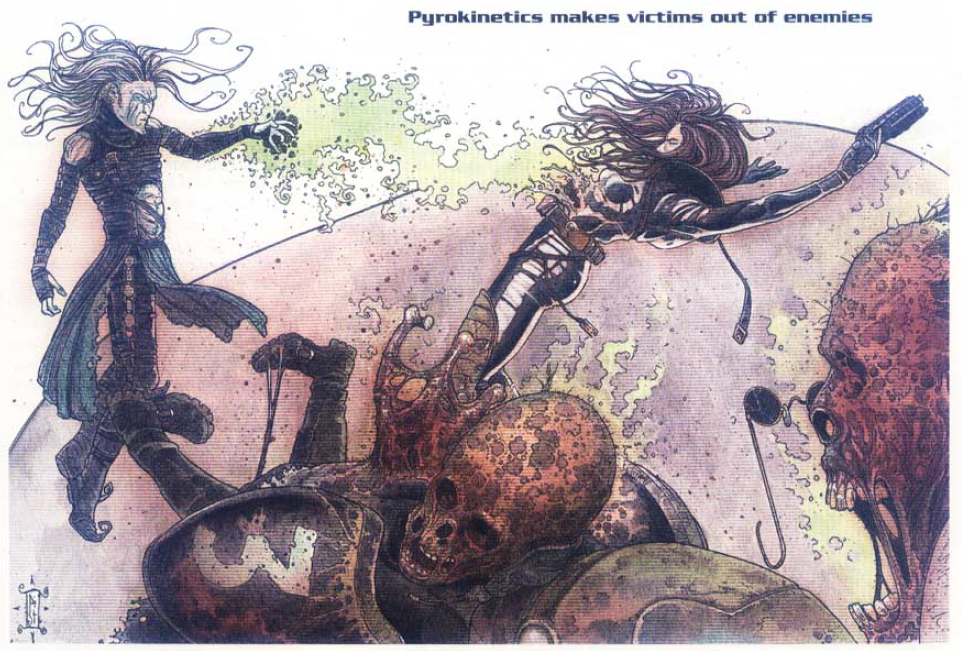 When I was a teen and saw this picture for the first time, I thought it was rad as hell. If only I had noticed the curly-toed elf shoes the wizard was wearing, maybe I would have felt differently. Personality: Telepathy - Obscure lets you pull the old Men in Black memory wiping trick. This wasn't in the core PHB at all, so I suppose it's a minimal effort thematic inclusion. Personality: Telepathy - Possess is what you use to turn someone else's body into your puppet. The game doesn't include any creepy examples of what you could use this for, but it doesn't prohibit those things either, so I give them a C- for effort. Personality: Telepathy - Suggest is basically Charm Person. Dark*Matter adds the ability to implant delayed suggestions so that you can create a sleeper agent panic or whatever. Another minimum effort thematic inclusion, and it doesn't discourage that kind of player from making those kinds of suggestions. The lack of social awareness is going to become a recurring theme in the way that Dark*Matter presents itself. That wraps up everything Dark*Matter has to say about options for psychic heroes. Won't you join me next time, when we explore the horrors of Arcane FX?
|
|
|
|
GimpInBlack posted:Next Time: Fortunate Sons - Character creation demo! Give me a few grunt concepts and I'll make a few characters to illustrate the system. Be sure to include MOS and whether they were drafted or not, and from what state, and bonus points if you throw in a period-appropriate photo reference. Armin Tamzarian - 19 y/o arrested in Springfield, MO for gang related activity (assault, petty theft, etc.) and given the choice to do jail time or go serve in Vietnam. Not drafted so much as press-ganged into service. MOS The Gunner.
|
|
|
|
GimpInBlack posted:In a nice little touch, the description of each alignment includes a sentence on how that type of person is single-handedly Losing Us This Goddamn War. can you share these? it'd be interesting to see what the designer believes is causing the war to be a losing proposition for the different archetypes.
|
|
|
|
 Chapter 4: Arcana - Diabolism Arcane FX  Up next, arcane spell casting! Dark*Matter arbitrarily decides that there's 3 major schools of magic that all arcane spell casters can learn - Diabolism (bad guy torture-porn spells), Enochian (altruistic mystical spirit mojo), and Hermetic (D&D style spell book wizards with a heavy focus on transmutation). Arcane spell casting works similar to manifesting Psychic powers in that it requires a hero to spend FX Points while attempting to cast a spell, and any hero that knows how to cast Arcane spells automatically starts with an FX Point pool with 5 FX Points. Players can also buy up to 5 additional FX Points either at creation or as they advance, which puts them at parity with the theoretical maximum number of Psychic Points a Mindwalker could have. The main difference is that any hero that learns Arcane spell casting can reach a maximum of 10 FX Points with no other restrictions, whereas your average Mindwalker is going to start with 3 or 4 Psychic Points and will then max out at 6 or 7 total Psychic Points even after purchasing all upgrades. Diabolism is focused around summoning and binding supernatural creatures of malevolent intent (the book suggests that we just call them Demons) and every spell requires the spell caster to make some kind of sacrifice. Diabolism is the easiest school of magic to learn because it's all about bargaining with Demons for greater power, but Demons are antagonistic towards mankind and will only help you insofar as you can threaten them or bargain with them or coerce them into cooperating. To keep Demons from completely loving you over, you have to make a blood sacrifice proportional to the complexity of the spell you're trying to cast - Marginal/Ordinary/Good/Amazing spells require that you sacrifice a point of Stun/Wound/Fatigue/Mortal damage as payment. You can voluntarily sacrifice more blood of the same quality, or make a single higher quality sacrifice, to get a bonus to your spell casting roll, and likewise you can try and spend less blood, or offer a lower quality sacrifice, to cast a spell but you'll incur a proportionate penalty to your spell casting roll. Also, the blood that you sacrifice doesn't have to be your own, or even from a willing participant, as long as the sacrifice is performed as a ritual. You can either set up an elaborate ritual altar upon which to make sacrifices, or just create a symbolic ritual weapon that you only use to hurt other people to draw out blood sacrifices. If you're sacrificing your own blood, you don't have to bother with either of these steps. Oh, and Diabolism spells also all have special gently caress You results if you roll a Critical Failure (natural 20) on your spell casting check because Demons are evil and capricious and love poorly designed and implemented systems. So, what kind of spells can you cast with all of this exsanguinated effort? Glad you asked! 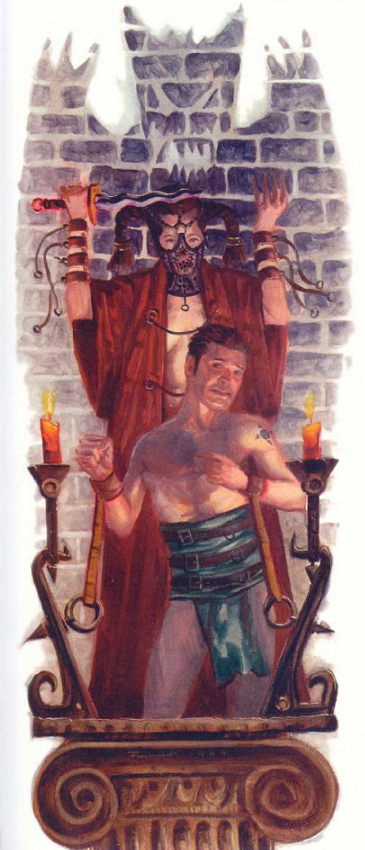 Just in case it was unclear that you have to be evil with a capital 'E' to cast Diabolism spells. Willpower: Diabolism - Black Warding is evil Mage Armor, except worse, because every time you are successfully attacked you have to make a Willpower: Resolve - Physical Resolve skill check or else the spell is completely wasted. Didn't invest any points in a skill that's otherwise totally unrelated for your evil wizard? Too loving bad! Critical Fail: You suffer a penalty to your armor and resistances until you spend a full round standing in natural sunlight. Willpower: Diabolism - Hellfire is your basic single target direct damage spell. It functions almost identically to Pyrokinesis, except that this attack can deal mortal damage on an amazing success while Pyrokinesis cannot, which makes Hellfire automatically 100% better than Pyrokinesis. Critical Fail: Whoops! You take damage from the spell as if you rolled an ordinary success. Willpower: Diabolism - Rend the Weave lets you counter other spells or disenchant on-going effects. You can automatically counter or disenchant your own spells with this spell, and it also takes a penalty if you try to use it to counter or disenchant spells from either the Enochian arcane school or the Monotheism divine school (because those are the good guy spell schools and you are the bad guy spell caster do you realize that yet). Critical Fail: You automatically counter or disenchant any of your spells that you have cast upon yourself and you also have to spend 1 additional FX Point. 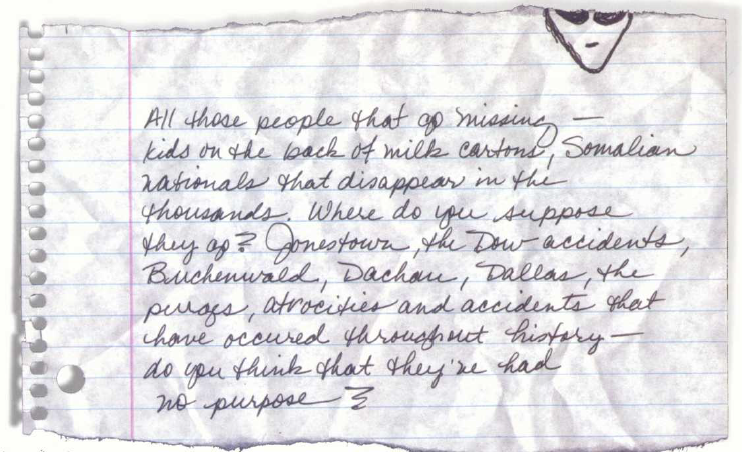 In case we have been too subtle, have you considered that Diabolists are bad guys? Think about it! Personality: Diabolism - Binding attempts to force a Demon to follow a command that you give it. You have to ritually prepare a binding circle that is symbolic of the Demon you're trying to bind. Once summoned, you can try to force the Demon to complete some finite task for you, with more powerful Demons being capable of comparatively more effort. The Demon is allowed to resist with Willpower: Resolve - Mental Resolve and assuming your first attempt to convince the demon is unsuccessful, you can retry once a week. The demon is bound to the mystic circle for the entire week (provided the circle isn't disturbed) and has a cumulative +1 weekly penalty for every week that it resists your commands. Of course, if you ask it to do something it wanted to do anyway (something EEEEEVIL perhaps) it can just agree to do your bidding without spending weeks negotiating about it. The spell also says that it can be cast - with a penalty - against any demon that hasn't been summoned within a ritually prepared binding circle and if you succeed then the demon still gets trapped within the current spatial locality and their ability to resist your commands accrues a cumulative penalty each day instead of each week. Critical Fail: You can never effect that specific Demon with any Diabolism spells ever again. Personality: Diabolism - Command is evil Charm Person. You can give anyone within range of your voice a command and compel them to follow it. The command has to be communicated in 12 words or less, cannot require and action with a duration longer than 10 minutes, and you must share a language with the target. Commands that would force the target to hurt themselves or an ally also give the target a bonus to resist the command. Critical Fail: You can't ever affect that specific target with the Command spell ever again. Personality: Diabolism - Spirit Wrack compliments Binding by causing the targeted Demon intense pain, giving it a large penalty to every action it takes. Spirit Wrack doesn't have to be cast upon a bound demon, but the spell typically requires that you know in advance the nature of the Demon you're going to cast Spirit Wrack upon, and if you shoot from the hip and cast this on a Demon without the necessary preparation, the quality of the effect is greatly reduced. Casting Spirit Wrack on a Demon that you have previously Bound also makes it much more likely to agree to your terms; however, this also gives you infamy among the rest of the Infernal Legion and makes it less likely that future Demons will answer your summons, and you might wind-up at the top of an infernal hit list if you pull this stunt too many times, or on too powerful a Demon. Critical Fail: If the Demon is bound, it gets a free attempt to break the binding with a -1 bonus. If the Demon isn't bound, it gets a -1 bonus to any actions it takes against the spell caster until the encounter ends. Personality: Diabolism - Summoning brings a Demon into the material world so that you can begin the whole process of bargaining with it. Summoning just brings the Demon into earth-space but doesn't give the Demon any obligation to help you or listen to you or even not to attack you, so you better either have a pleasing sacrifice ready and waiting, or else have prepared some of the other spells that let you force it to bend to your will. Critical Fail: The Demon you were trying to summon knows that you botched the attempt and can respond however it likes; it could just ignore you, or it might be curious about what you were trying to do and appear anyway, or it might be pissed off at your clumsiness and show up to murder you. For one week, any actions taken against you by the target Demon or any of its minions get a -1 bonus. Personality: Diabolism - Tongue of the Damned says it straight up copies the effects of any one psychic skill chosen from Clairaudience, Clairvoyance, Postcognition, Precognition, Psycholocation, or Psychometry. Essentially, you ask a Demon any question that could be answered using one of those skills and the Demon responds with a degree of accuracy and truthfulness based on the quality of your success. You can cast this spell without making a sacrifice if you utilize a Ouija board or some other type of mystical communication device, but the quality of the response diminishes. Wowza, one Diabolism spell replicates 6 Psychic specialty skills, when any single psychic hero could only ever learn any two of those skills. Game balance! Critical Fail: The Demon gets pissy like with a failed Summoning spell and might pull a poltergeist routine or attempt to possess the spell caster or do some other sophomoric poo poo. Next time: Enochian wizards are powered by vows of honor and can fall, like paladins, if they have to break a vow for any reason!
|
|
|
|
Leraika posted:My first thought when reading Dark*Matter's magic system was 'you know, CTech does this better because at least there you don't have to level up every spell/parapsychic skill individually'. yeah, although that's more of an issue with Alternity itself. Since classes barely exist as a concept, no part of your character inherently improves as you gain levels. instead, you just use your XP to buy more skill ranks or other perks like more HP or more spell casting points or whatever. the problem is that these XP points aren't obviously measured against any kind of baseline cost, so it's really loving counter-intuitive to tell whether you should be buying things like +1 FX Point or whether you should be investing in higher skill ranks or buying Rank Benefits that you qualify for or etc. it'd be like if 3.X D&D just gave you a "LEVEL UP" point every time you gained a level and you could trade it for +1 BAB or +1 Spell Caster Level or +Hit Die in HP or gain 4 ranks in a skill or gain 1 extra feat, and all of those buying options were presented like they were equally valuable. Mors Rattus posted:I love spending large amounts of pagespace on a magic system that is positioned for players to take but which is written in such a way that no player will ever take it outside of a Let's Play The Villains game. oh ho ho, just wait until we get to the DM chapter and they give advice about players that want to play as "the Villians". it will make even less sense than what we've already seen
|
|
|
|
Leraika posted:Yeah, but you could do, like 'demonology' as a skill, or even 'demonology + stat' as a skill, instead of 'demonology - specific spell' as a skill. oh, for sure. actually, if you squint real hard, it's even worse than it looks. normally, every broad skill and specialty skill default to a single attribute, so you see something like Willpower: Resolve - Physical Resolve and you know that both Resolve and Physical Resolve default to your Willpower. but, the arcane and faith FX powers start to include broad skills and specialty skills that default to different attributes! so, you can get stuff like Willpower: Diabolism - Hellfire and a separate entry for Personality: Diabolism - Command and the implication is that you'd have to buy the broad skill twice to use the different spells that default to different attributes. plus, if you want to get better base scores with (for example) Diabolism, you can't only buy Willpower attribute increases with your level up points, because the other half of your skills that default to Personality won't be improved. it's like a really clumsy mash-up of the 2E AD&D non-weapon proficiency skill list and the percentage based skill system used in CoC. you can see what they were going for, but the execution is just awful
|
|
|
|
Feinne posted:FX broad skills didn't have an ability score associated at all, the spells just used the ability score it said they did. huh, i never caught that in years of playing Alternity in high school (and evidently neither did anyone in my group). that's even dumber then, because now you're buying a broad skill with no associated attribute, so if you're trying to use some specific spell untrained you've got to re-figure what your action check is based on each individual attribute.
|
|
|
|
 Chapter 4: Arcana - Enochian Arcane FX  Enochian magic was apparently pioneered by English magus John Dee, who is related to real-life occult tomes like the Book of Soyga and the Voynich Manuscript (which to this day has yet to have its cypher successfully cracked). In Dark*Matter, he developed the Enochian style of magic to be a counter school to Diabolism. It's based on making successful contact with supernatural entities and asking them to perform favors for you, but unlike the EEEEVIL school of Diabolism, Enochian spell casters are making bargains with benevolent outsiders. The book actually confirms that these are the same entities that answer the prayers of divine spell casters, which makes Enochian magic the non-denominational school of divine spell casting. 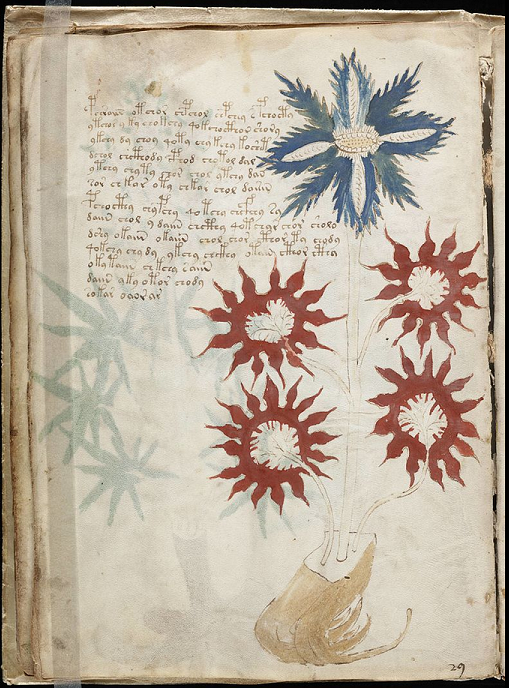 There's literally zero art included in the section for Enochian magic, so I'm going to include pictures of the real-life Voynich Manuscript instead. It's a real Unsolved Mystery and I think it's rad as hell. Unlike Demons, these benevolent outsiders (the book says we can call them Angels) rarely manifest on the material plane, and take a more abstract interest in the prevalence of "good" as a concept instead of promoting some specific cause or agenda. Likewise, bargaining for power / casting spells with Angels doesn't require blood sacrifice; instead they require that the Enochian make a solemn Vow in return for their assistance. Vows can be anything really, as long as they include altruism and/or require the Enochian to perform some type of ritual behavior. They can be one-time deals where the Enochian agrees to perform some specific act in return for power, or they can include on-going commitments to honor an ideal or perform some kind of continual service. One-time Vows give the Enochian 30 days from the date a Vow is made to actually complete their Vow, and within that 30 day window the Enochian can request the same assistance / cast the same spell without having to make any further Vows. On-going Vows require that the Enochian make some attempt to make good on the Vow each week, but for as long as they keep their Vow they don't have to make further Vows to cast the same spell or summon help from the same Angel. Example Vows provided by the book: Marginal Vows - Offering a serious prayer at a temple or shrine associated with an Angel, or giving a small offering at the temple or shrine that is symbolic to the Angel. Marginal Vows shouldn't require more than an hour's worth of effort each month if made as an on-going Vow, or more than a day's worth of effort if made as a one-time Vow. Ordinary Vows - Committing to tithe 10% of your salary to a church or group that worships the Angel, or spending one weekend each month building shelter for the homeless or volunteering in a soup kitchen, or donating a week's salary to a charity or organization that is symbolic to the Angel. Ordinary Vows should require several day's worth of effort each month if made as an on-going Vow, or up to a week's worth of effort if made as a one-time Vow. Good Vows - Committing to tithe 25% of your salary to a church or group that worships the Angel, or making a pilgrimage to a specific holy site that is symbolic to the Angel, or Vows of silence or fasting that last for multiple days. Good Vows should require at least a week's worth of effort each month if made as an on-going Vow, or up to a month's worth of effort if made as a one-time Vow. Amazing Vows - Amazing Vows are the most extreme pledges that an Enochian can make and should involve a great deal of personal sacrifice. Extreme fasting for an indeterminate amount of time (ex: until Palestine is recognized as a sovereign state), completely forsaking interaction with other humans, permanent Vows of silence or celibacy or pacifism, taking on full-time employment with a charity or non-profit organization that is symbolic to the Angel, promises to make pilgrimages to locations that don't exist on Earth, and of course sacrificing your own life to protect another or serve a higher purpose. Amazing Vows should occupy at least half of the Enochian's waking hours each month if made as an on-going Vow, or up to a year's worth of effort if made as a one-time Vow. 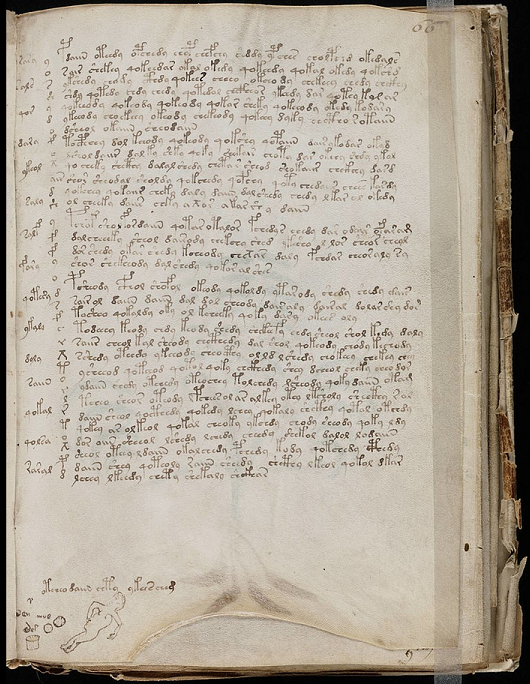 If the cypher utilized throughout the text is actually just a gibberish hoax, it's an insanely complex hoax for the time period from which the text originates, because it contains internally consistent things like word structures that follow phonological and orthographic laws. Better hope that your GM enjoys plotting out a day calendar for a fictional character that can extend years into the future to accommodate all of the Vows you've made to ensure that your character is making good on their word! Why? Well, if an Enochian breaks a Vow (and there's no exception made for extenuating circumstances) then they Fall just like paladins! That's right, broken Vows immediately revoke your access to whatever spell you had cast with said broken Vow, and you take an on-going penalty to ALL of your actions (proportionate to the level of Vow that was broken) until you atone! Atoning requires that you make another Vow of the same quality and duration and successfully complete it, which can potentially leave someone with an unplayable hero if their GM is a dick and keeps putting them in situations where they continually break the atonement Vows. Amazing! So what kind of power can Enochians wield for all of this inconvenient bullshit? Willpower: Enochian - Eye of Fate is every divination spell ever written. You can see a target's future and divine one specific type of danger that the target may encounter. The GM has final say over what this spell can and can't reveal and you can't use it to thwart the GM's masterfully scripted plot or override the actions of their amazing GMPCs. Ordinary Vow. Willpower: Enochian - Grace mystically forces someone to find you more likeable. Their attitude shifts one step further towards Ally on the NPC reaction scale for each level of success you achieve and you also get a proportionate bonus on all Personality skill checks you make against this person. It's not mind control, you're just making them more agreeable to what you're asking them to do. After the spell duration ends, the targets gets to check and see if they realize that you were mystically altering their mood. Ordinary Vow. Willpower: Enochian - Halo is Mage Armor but better, because the amount of protection you get increases if you use your magical armor to protect someone that is helpless or defenseless (say, by throwing yourself between them and a source of harm). Halo also has a Rank Benefit that you can eventually purchase which causes the magic armor to deal damage to any Demon or Diabolist that makes contact with you, and nothing can prevent or reduce the damage taken. Good Vow.  Illustrations within the manuscript are used to break the work into 6 different sections, including broad topics like Herbal, Astronomical, Biological, Cosmological, Pharmaceutical, and Recipes. This crazy-rear end plant is from the Herbal section, and doesn't resemble any known terrestrial flora (current best-guess is a sun flower). Willpower: Enochian - Lumen combines Light and Arcane Mark from D&D into a single spell. That's it and that's all. Marginal Vow Willpower: Enochian - Peaceful Shroud is magical Novocain. It doesn't heal any damage, but it allows you to ignore up to 2 levels of wound penalties resulting from damage. Marginal Vow. Willpower: Enochian - Unravel Shroud is just Disenchant. It's easier to perform on spells cast by someone weaker than you and harder to perform on spells cast by someone stronger than you, and you can always automatically disenchant your own spells. Marginal Vow. Willpower: Enochian - White Salamander creates a mobile ball of fire that's invisible to everyone except you. You can move the ball of fire around at will and it will ignite any objects that it touches that could be lit on fire by a mundane source of fire. This spell can't deal damage directly, but if you place the fireball on top of someone then they have to roll to save against damage as if they stood in an open source of fire. Good Vow. And that's all for the underwhelming school of Enochian magic! Seriously, they didn't even include an example of a spell that would require an Amazing Vow. Up next: Hermeticism!
|
|
|
|
Cooked Auto posted:Actually the mystery of the Voynich manuscript has pretty much been solved now. Mors Rattus posted:Incorrect. That dude made his claims without even consulting the librarians who have spent their lives taking care of and studying the manuscript. He has no evidence for his claims regarding Latin abbreviations, and the ones he claims to have found are Latin grammatical nonsense. He can provide no evidence of the claimed indices, which, if they existed in the Manuscript, are not there currently. fwiw i hope it's never 100% decoded because the mystery of what it could be is way cooler than whatever it actually is
|
|
|
|
 Chapter 4: Arcana - Hermetic Arcane FX  The Hermeticism arcana is pretty short, compared to Diabolism and Enochian arcana, and there's really not a whole lot of fluff to cover. There's a couple paragraphs about how Hermeticism started as ritual spells discovered by the ancient Egyptians and their teachings were coded behind ciphers and hidden passages, but the long and the short of it is that Hermeticism is a D&D Wizard. It's the only Arcane FX to actually have rules governing how a character learns Hermetic spells; imagine having to roll a knowledge check to see if you can decode the spell and write it into your spell book like an D&D Wizard and you're on the right track. If you fail to scribe the spell, you can't try again until you improve your language skill for the language in which the original copy is written etc. etc. Oh also, Hermetic spells all have some kind of Critical Failure chance, but there's no flimsy, in-setting justification for why. And, some of the spells randomly have material components listed, but some do not; evidently the designers couldn't agree on just how close to a D&D wizard they wanted this arcane school to hew. Intelligence: Hermetic - Daedalus Improved is just a re-skin of the D&D Wizard spell Flight. It's just as busted here as it can be in D&D; arguably even more so, because of the relative rarity of verifiable arcane power in-setting. You fly like Superman (no wings) and if you try to fly under water or through the vacuum of space this spell still works (although it doesn't provide the means to survive those environments). Critical Failure: You suffer from vertigo and all of your actions made over the next 60 seconds take a +2 penalty and your natural movement speeds are reduced by half for the same duration.  The section for Hermeticism doesn't have dick for art either, so here's some pictures that are vaguely associated with the nonsense I'm typing. Daedalus Improved allows you to fly kinda like this, except you'd be asphyxiating and/or explosively decompressing at the same time. Still, what a rush! Intelligence: Hermetic - Glamour is a combination of multiple spells from the D&D school of Illusion but the end result is an extremely versatile illusion spell that is really hard for anyone to disbelieve (+3 penalty to all attempts to disbelieve) unless you incorporate blatantly fantastic elements into the illusion (like green pigs reciting The Canterbury Tales in the original middle-English verse). The illusion lasts for one hour and can cover a total area of 30 m2 unless you walk further than 30 meters away from the illusion, in which case it continues to persist for d6 minutes before petering out. Critical Failure: Whoops you illusion yourself and take a +1 penalty to all actions for the next hour as your brain struggles to differentiate between reality and the whammy you just cast on yourself. 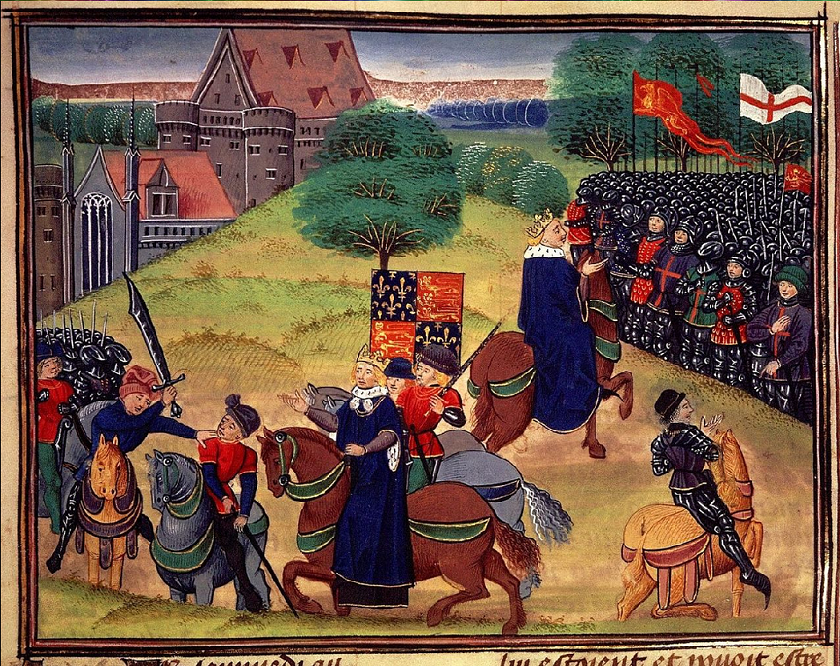 If you try and make your illusion resemble an artistic depiction from the late 14th century of one of the Canterbury Tales, your victims get a bonus to disbelieve your illusion. IMO don't duplicate two images of Richard II in the same illusion and you should be fine. Intelligence: Hermetic - Homunculus allows you to build your own familiar, so it's basically a re-skin of the D&D Wizard Find Familiar spell. You get all the same benefits - you can command it telepathically and share senses and etc. - but it always looks like a little shitgoblin no matter what formula you follow. Critical Failure: The shitgoblin turns against you and seeks out one of your foes and pledges to become your foe's life-long servant and assist in bringing about your ruin. Interestingly, you still get all of the other features like telepathic communication and sense sharing, the shitgoblin just hates your guts.  I pulled this picture from the Dark*Matter bestiary because holy gently caress look at it. It's like the old Simpsons joke "My life is pain kill me now" because you can really see why this little shitgoblin might wish it never existed in the first place. Intelligence: Hermetic - Ligature is Hold Person. Nothing more, nothing less, but it's an even better save or suck ability in a game that doesn't have saving throws or a myriad of ways to counter or remove harmful magical effects. Critical Failure: You cast Hold Person on yourself. D'oh! Intelligence: Hermetic - Shapechange is Polymorph and it's just as crazy busted in Dark*Matter as it is in every iteration D&D. You can morph into any creature for which you own a well-tanned hide, including non-terrestrial beings or supernatural outsiders (although the latter two impose a slight penalty on the attempt). Critical Failure: You get your sense wires crossed and hear color and taste sound and everything is all FUBAR for an hour, which of course only imparts a +1 penalty to all of your actions. This is literally the same penalty as the Glamour Critical Fail and I'm unclear on whether that was intentional or not. Intelligence: Hermetic - Sleep of Morpheus is Sleep. Goddamn, they just took a highlight reel of the busted poo poo a D&D Wizard can do and slightly changed the name of each spell but otherwise left the functionality intact. All of these spells are even more OP in Dark*Matter than they would be in D&D because the Alternity system doesn't have Saving Throws and there's no Hit Dice threshold to block the effect. Resisting any of these hostile effects requires the victim to make a successful skill check with a specific skill and if the victim doesn't have that skill, no matter how high their level, they're going to suck poo poo and become affected by the spell. Critical Failure: You fall asleep like you just swallowed two Ambien and chased them with a whole flask of rye whiskey. Intelligence: Hermetic - Transmutation is what everyone thinks of when they hear the word alchemy, except it works. If you can't come up with ways for your wizard to loving wreck the global economy once they learn this spell, your imagination is irreparably atrophied. There's bonuses and penalties for trying to convert unlike elements into dissimilar physical states (liquid > solid, for example) but who loving cares, once you can cast this spell the entire system just falls apart. The only real mitigating limitation is GM fiat, so as long as you can win a game of "Mother, May I?" your options for breaking poo poo are limitless. Critical Failure: Oh no something in your process imposed a flaw in your creation. Who loving cares being able to reliably and predictably perform literal alchemy is worth whatever incidental 5% critical failure flaw you encounter. That actually completes all of the Schools of Arcana for Chapter 4! Next, I will slog through the 3 schools of divine magic!
|
|
|
|
Mors Rattus posted:Chitter chatter bang bang, I'd say. i think you win the award for most dated pop culture reference (1968) I've seen in the thread. edit: holy poo poo almost 50 years old. that joke's an antique
|
|
|
|
Halloween Jack posted:I think one of the best ways to introduce a bit of horror into D&D is to emphasize that the party are adventurers as people through most of history understood it--wandering people with no obvious social ties, and therefore, probably degenerate criminals who'd kill you soon as look at you. Though I'm not suggesting you play through the plot of Flesh+Blood. not just that; if the party includes any kind of full progression caster, they're likely the most deadly thing in their immediate geographic region. we joke about druids becoming sentient hive clusters of hegemonizing bears, but how likely is the local king/warlord/mayor to be super excited that a walking atomic bomb has randomly decided to set up shop in his kingdom/province/town?
|
|
|
|
 Chapter 4: Divine Magic - Monotheism FX  Divine magic is another system that appears to be blatantly ripped from parts of AD&D because the very first divine power source, Monotheism, is just the iconic AD&D Cleric spells from the Good and Healing domains. It's arguably one of the more functional FX power sources because it has the lowest barriers to entry - you don't have to research your spells from arcane formula firsthand, you don't have to create a make-believe day planner to keep track of arbitrary oaths, and you don't have to gently caress around with No, my problem with the Monotheism power source is that the book is very explicit that this power source is only available to members of the Abrahamic faiths (Judaism/Christianity/Islam). Your character doesn't literally have to be a rabbi or priest or cleric, you just have to be observant, but by tying the power source to actual, real world religions, you potentially open a whole nasty can of worms into your Men-In-Black-with-the-serial-numbers-filed-off RPG. My biggest objection is that this (along with some other things that we'll cover further into the book) create the explicit setting assumption that some combination of Judaism/Christianity/Islam is objectively correct - that's got some pretty unsettling implications for a lot of people that don't believe in those faiths or for people who have been persecuted by these religions. If the God of Abraham, Isaac, and Jacob literally exists and is directly empowering his faithful with miraculous powers, what kind of aspersions does that cast on people that are homosexual or trans or adherents of another faith? There's a bunch of nasty conclusions you can draw if you follow this piece of setting logic far enough (was the mass slaughter of indigenous American peoples by Spanish mercenaries actually justifiable because they were acting at the behest of an omnipotent God that literally exists?) and it really doesn't add anything to the quasi X-Files setting vibe that the rest of the book tries to invoke. There's a ton of ways that this whole issue could have been side-stepped, but it's in the setting, so if you're going to play the game RAW just know that God is real. 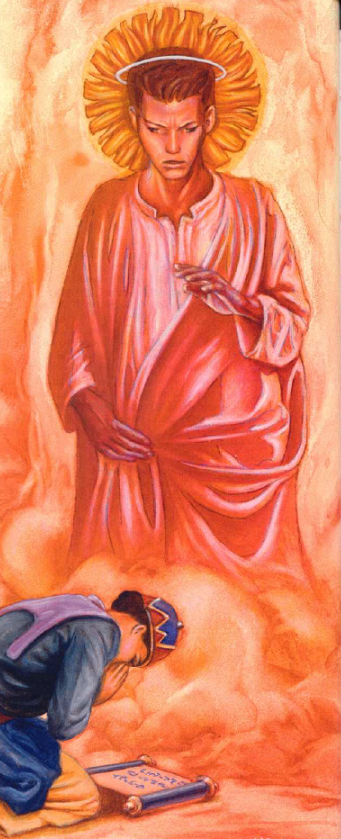 I'm still amazed that the devs decided they wanted their sci-fi game about alien greys and the Illuminati to incorporate the literal existence of the biblical God. Anyway! Here are the Monotheism FX powers. It's a greatest hits album for AD&D clerics: Willpower: Monotheism - Blessing is just the first level cleric spell Bless. Willpower: Monotheism - Cure is Cure Light/Medium/Serious wounds, depending on the quality of success you roll. Willpower: Monotheism - Demon Ward is Protection against Evil. It creates a barrier that keeps out Demons and Diabolists (because they're objectively evil in a world where the God of the Old Testament exists). Pretty cool that the implementation of Monotheism completely eliminates any shades of gray morality you could have tried to wring out of Diabolism! Willpower: Monotheism - Exorcism is Turn Undead only there's no actual undead creature type in Dark*Matter, so it just turns or rebukes Demons or other possessing entities. Personality: Monotheism - Aura is Shield of Faith, and as an added bonus anyone that looks at the Monotheist while using the Aura power gets automatically shifted one step further towards Fanatic on the NPC reaction scale! Remember, Alternity doesn't have saving throws, so even the most black-hearted Diabolist that eats puppies and puts cigarette butts out on children will be just as swayed towards the Monotheist as literally anyone else. They should have named this spell "Poochy the Dog". Personality: Monotheism - Guidance lets you play "Mother, May I?" with the GM and ask one question about your present course of action and the GM has to answer you more specifically the better the level of success you roll. Personality: Monotheism - Signs & Portents is Charm Person but it's extremely potent. Essentially you get a huge bonus to any skill checks you make to persuade people when this spell is active; I'm talking up to a -5 bonus on an amazing success when casting Signs & Portents. For reference, the Alternity bonus die system skips d10 entirely, so a -5 bonus means you're rolling d20 MINUS another d20 on a roll-under skill check. Yeah. Personality: Monotheism - Vision is almost the same thing as Guidance above, except that if you get an Amazing success an actual Angel, or other heavenly messenger, appears to you and gives you tangible help regarding whatever problem you were trying to solve. Just in case you forgot that God is real and he is your friend. I definitely didn't recall the in-setting justification for Monotheism being that the biblical God was real. This is definitely a detail that my high school group of nerdy friends completely glossed over. My only guess is that none of us ever played a character with Monotheism FX powers? Otherwise, I feel like some of the angry teenage atheists that comprised said group would have had a lot more to say about this section of the book. Come back next time for
|
|
|
|
Hostile V posted:Happy October y'all! Don't burn yourselves out on projects such as these by attempting to keep momentum going! It's okay to take a break and come back when you find that passion again! oh cool, I was just wondering to myself the other day when Hostile V was going to pick back up reviewing books again. any chance that, after what you've got pre-planned, you'll be going back to AFMBE? I was really digging the way you presented that series.
|
|
|
|
Hostile V posted:(don't do that, don't be like me, write this poo poo up in advance wholly and then post it because the hard part is the writing and when you write it in chunks like I do, it's real easy to just lose the momentum) lol it's the opposite for me. if I tried to write an entire review before posting any of it I'd get overwhelmed by all the work and give up in record time. doing small updates per chapter/section is how I keep from burning out (also having a 3 y/o climb the walls means I almost never have enough free time to work on anything but bite-sized updates). I do write an entire update at once though - like when I have time to review another chapter for Dark*Matter I sit down and write that entire thing out at once.
|
|
|
|
Cythereal posted:Hooray, being gay means you're mentally unstable and sliding into insanity. it's really uncomfortable how the rules are so unnecessarily homophobic. it's also a really loving weird design choice to have sexist PCs lose sanity if they are forced to confront their incorrect views, but racist PCs (why is this even an option fffffffffff) apparently don't ever have to change their minds? or are racist PCs totally open-minded about encounter other races in a positive light? only sexists and homophobes are irredeemably corrupted? it's such a weird curveball because the beginning of the book has that stupid stick figure edgelord warning about how good and evil are presented as equally valid choices divorced from our morality and it's up to the players to decide what's really right and wrong, and then within the actual rules CHOO CHOO it's a freight train to puritan morality town!
|
|
|
|
PurpleXVI posted:They're also the class with a detailed NPC whose stated purpose is to rape straight people. It's also declared that they tend to become supersex hobos who receive magic guidance on where to find their next enchanted gloryhole. Also generally the constant implication that if you're anything but straight(and thus oppressed by MUNDANE SOCIETY) you must constantly be hunting for more sex, usually with new and often anonymous partners every time. i was gonna say, wasn't that the game where the entire sex wizard class was based around having non-consensual encounters with strangers to teach them magic, so I'm glad the answer is "of course it is". I get the whole text by omission thing, but the comparison to rules for abortion makes the whole situation even weirder. okay, you had enough sense to decide that abortion really wasn't a topic that needed to be mechanically addressed by your game, but somehow homosexuality and racism and other unnecessary poo poo needed to be in there? that makes it seem less like an error by omission and more like an intentional decision. also, it's interesting to hear that the game later embraces all of the vitriol of your average teenage atheist when talking about the evils of Christianity. it definitely sounds like the rules were written by someone that was raised in a strict, conservative household and some aspect of designing this game was a gently caress YOU DAD to having to go to church, but then a lot of the underlying assumptions implicit in religious doctrine just slip into the game without any critical examination. "Modern Christianity is a bunch of charlatans and snake oil hucksters preying on the sheeple! Also finding out you're gay could drive you insane because it's so icky! . . . What?"
|
|
|
|
it's motherfucking magic; i don't have to calculate the relative distance between poo poo. the spell teleports me inside the other space ship because it's a spell that teleports you places and it doesn't pay attention to what physical laws would or would not allow - the pertinent thing is that it is my will to be on that space ship and so the spell obeys. gently caress, paizo, this is a solved problem. give me a job at your money factory, you nerds
|
|
|
|
 Chapter 4: Divine Magic - Shamanism and Vodun FX  If it seems like Shamanism and Vodun were tacked on as an afterthought and treated like vestigial appendages, it's because that's exactly how Dark*Matter implements them. They're functional spell schools, but they've got a few extra hurdles that get in the way of casting their spells. Shamanism - Rather than spending an FX point and making a skill check to cast a spell, a Shaman must perform a ritualistic trance ceremony with a difficulty threshold relative to the power of the spell being cast. If they fail then they lose the spell and their FX point, and if they Critically fail then their spirit gets lost in the astral Hunting Grounds and must be rescued! Take on-going Fatigue damage while your meat body lies in a persistent vegetative state, and hope that you aren't the only member of your squad that can access the astral realm or else this is a death sentence. This is going to happen at least 5% of the time because Dark*Matter counts a natural 20 roll as a critical failure, and most of your Shaman spells require multiple trance rolls before being cast. Vodun - Houngans must perform elaborate ceremonies before they cast their spells. Each ceremony is different based on what spell is being cast and which Loa is being sought, and each one includes a pretty significant time component that can't be skipped. To give you an idea of how inconvenient this is, keep in mind how Alternity breaks down time - 1 minute of time is 5 Rounds and each Round is broken into 4 Phases. Characters can potentially act in all 4 Phases of each Round, meaning a Houngan casting a spell that requires a 1 minute ceremony is giving up 20 potential actions. Keep in mind, that's the shortest ceremony that can be performed, and most Vodun spells require much, much longer ceremonies. It's pretty obvious that Houngan are meant to cast their spells ritually and not in the heat of battle, but the time component requirement of each spell makes me wonder if the designers were aware of how the Alternity system actually integrates time with action rounds. BUT WAIT! Not only does the Houngan have to invest a non-trivial amount of time in the spellcasting ceremony, if the Houngan gets a critical failure on their spellcasting roll, they manage to piss off the Loa they were summoning and instead it decides to haunt them and cause them grief, unless they can appease it with a persuasion skill or by making a Vow (just like Enochians!) to do something that would please the Loa. HOWEVER, if they also manage to fail the persuasion roll, or the Loa doesn't think their Vow is very good, the Loa completely possesses the Houngan and gets to do whatever it wants with the Houngan's body for a very long time - 20 Days minus the Houngan's Personality score, and remember that in Alternity the human maximum for all ability scores is 14. At absolute best the Houngan is getting possessed for nearly a week, and likely much longer. A final insult to injury - if the Houngan critically fails their spellcasting roll, then critically fails their persuasion roll to avoid possession, the Loa gets to posses them for 40 days minus the Houngan's Personality score! Nothing like completely losing control of your character for a month of game-time because you had the temerity to try and use one of your iconic class abilities. It bears repeating, possession of your Houngan is going to happen at least 5% of the time, because of Dark*Matter's critical failure rules, with a non-trivial chance of losing your hero for months at a time as well! So with all that being said, the effects that these spells can create must be incredibly powerful, right?  Shaman powers go! Willpower: Shamanism - Dream Walking is Clairvoyance and Clairaudience wrapped into one package. Willpower: Shamanism - Guide My Hand gives the Shaman a -2 bonus to one combat specialty skill for one hour. This isn't actually terrible, although casting it always carries the risk that your Shaman might end up in a coma. Willpower: Shamanism - Hunter's Stare is likely the best Shaman spell. It requires no trance and allows the Shaman to make a contested check versus Willpower against another target within 3 meters and if the Shaman is successful, the target loses their next 1/2/3 actions. 1/2/3 cheers for action denial! Willpower: Shamanism - Spirit of the Beast gives the Shaman 4 ranks in a specialty skill (and the associated broad skill if the Shaman doesn't have it) that is related to some kind of animal. For example, the Shaman could invoke Wolf and get 4 ranks in Willpower: Investigate - Track for 1 hour. It doesn't say whether these bonus points stack with skill ranks the Shaman already has or if they just replace them, so the practical value of this spell is going to vary depending on how your GM interprets the spell's effects. Willpower: Shamanism - Venom Spirit lets the Shaman eat some poison and then cast the debilitating effects of the poison into another person. The Shaman actually has to succeed at a Constitution check with a -2 bonus vs whatever poison they ingest and if they fail then they lose the spell and suffer the effects of said poison! Probably not ever worth the hassle. Personality: Shamanism - Animal Voice gives the Shaman the ability to speak with animals. The book straight up says that animals don't perceive the world like humans do and that things like numbers and colors are meaningless concepts to them. I guess if you need vague advice about whether or not the dog that crapped on your lawn was also in heat, you could use this spell to ask your dog and find out. Personality: Shamanism - Ghost Dance gives everyone that participates in the ritual a pretty decent deflection bonus versus melee and ranged damage. The spell lasts for an hour which makes it a pretty potent pre-combat buff, but if the Shaman leading the spell fails their spellcasting check, everyone involved instead takes a point of fatigue damage. I guess you only get tired from dancing if the head Shaman fumbles their mojo? Personality: Shamanism - Trance Visions is "Mother, May I?" for Shamen. I seriously have no idea why almost every spellcasting class has one of these powers, except that they must fit into each school in a vaguely thematic way. I still don't believe that any of them all executed well enough to justify their inclusion, but nobody designing the game asked me what I thought 20 years ago, so whatever. And now onto the Voudon Spells! Willpower: Voudon - Erzuli's Fetish creates a voodoo doll and allows the Houngan to give the afflicted target penalties to all their actions. Except, when the spell is first cast the target gets to make a Willpower: Resolve - Physical check to resist the effects, and if they get an Amazing success on this roll then they can't be affected by that Houngan's voodoo dolls ever again. Pretty great risk to take, on top of potentially having your Houngan possessed for upwards of a week. Willpower: Voudon - Gris Gris creates good or bad luck charms that the Houngan can give to friends or trick enemies into accepting. Nothing especially remarkable. Willpower: Voudon - Helpful Possession allows the Houngan to choose a Loa associated with any specialty skill and summon that Loa into their, or another participant's, body for 24 hours. The Loa doesn't completely take over the target, instead they passively grant a -1/-2/-3 bonus to the specific specialty skill for which they were summoned. You can have more than 1 Loa riding you at a time, but each additional Loa after the first imparts an escalating difficulty penalty to the spellcasting check. Willpower: Voudon - Loa of Healing allows the Houngan to heal another target by trading their Stun (1:1)/Wound (2:1) points for the target's Wound/Mortal points. Also, the Houngan takes fatigue damage at the end of the spell regardless of how much damage was healed. This is strictly worse than Willpower: Monotheism - Cure but I guess having the option is better than nothing. Willpower: Voudon - Negate the Spirit creates Zombis under the Houngan's control. Because an actual Voudon Zombi isn't an undead abomination and is instead just a living person that's been fed a poisonous concoction that makes them extremely suggestible, the Voudon has to provide food and water and etc. for the Zombis. Personality: Voudon - Ayza's Juju is a floating Last Resort point (basically a Hero Point or Action Point or whatever analagous thing other systems have) that the Houngan can use instead of spending one of their actual Last Resort points. This is better than it sounds, because Alternity normally requires players to spend their limited XP to rebuy spent Last Resort points (yeah, it's one of those systems). Personality: Voudon - Legba Rides is "Mother, May I?" for Houngan. Yep, they get one too. We're finally done with all of the Arcane character creation Come back next time for Chapter 5: The Secret History of the World - More Metaplot Than You Can Shake a Stick at That Will Never Be Player Facing Information, Ever, Because Dark*Matter is 90's as gently caress!
|
|
|
|
Hostile V posted:[*]Angry-Dad Christianity: i'm not sure if this is your phrase or the book's, but it made me laugh way too hard because i'm pretty sure that's the actual form people practice right now, today, in reality, without some imaginary plague to inspire it the eye eating element is the thing that screams "THIS IS THE AUTHOR'S PRIVATE FETISH / WANK MATERIAL" to me. the rest of the setting is full of weird plot holes and involves fictional leaps of logic that basically no one would ever reach on their own, but the part about having to eat eyes to temporarily regain your sight is what sends the whole thing into piss wizard territory.
|
|
|
|
Barudak posted:Who can forget that iconic scene in The Last Jedi where Luke teaches Rey how to give stormtroopers cancer. that would have been a pretty cool direction for the new trilogy to take it though - the Force is accumulated background space radiation and the more you use it, the more cancer you get. sith lords don't look like moldy potatoes because they're "evil" they just have mega space cancer from using the Force so much. would you believe Yoda is actually a 32 year-old human male? Force cancer is a motherfucker.
|
|
|
|
 Chapter 5: The History of the World  We are told that comprehending the world of Dark*Matter requires us to understand that all things are connected - no matter how unlikely that may seem - and that everyday life is just a filter that hides the alien creatures, occult conspiracies, and supernatural forces that toil endlessly to take over the Earth! The reason that the Dark*Matter campaign is named Dark*Matter is because in the game universe, dark matter particles are real, quantifiable things that exist, and the total amount of them that exist throughout the universe oscillates between periods of high and low tides. No, there's no explanation given for why the amount of dark matter in the universe fluctuates, nor what law of physics governs this process; it just happens the way it happens, so loving deal. When the universal dark matter tide is low, physics behaves like we would normally observe, obeying Newtonian principles or the principles of relativity according to your frame of reference, and all other worlds, dimensions, and timelines are separated and segmented away from each other. Supernatural things can still occur, but it's extremely unlikely, and even correctly following some occult ritual that's proven to create a supernatural effect requires a significantly greater expenditure of resources. When the dark matter tide is high, all of the separate dimensions start to collapse into a single "prime" universe and all kinds of supernatural wackiness slips through the cracks between realities and aliens can visit the Earth and the Lost City of Atlantis can be accessed via warp gates and every other kind of schlocky, Sci-Fi channel-esque science fiction can occur. In case it wasn't clear, the Earth of 199X presented in Dark*Matter is at the crest of the highest dark matter tide ever recorded, which is what allows your investigator to go on all of these bizarre adventures. Which very neatly sums up one of my major beefs with Dark*Matter, especially as it pertains to the world building/metaplot as presented in the book: almost everything of any historical significance was directly or indirectly caused by supernatural or otherworldly forces pursuing their unfathomable designs for world domination. This is something that a lot of other FAF reviews have discussed and at length, but it really kills my ability to enjoy the fictional Earth presented in Dark*Matter if human being are more or less completely absolved of any of the horrific decisions we've made as a collective species because there was always some alien overlord or occult gestalt or some other contrived supernatural abomination that was masterminding the whole thing. As has been previously stated, it's also hugely disrespectful to the people that had to suffer through the horrors of real human cruelty to imply that all of their torment wasn't really that horrific because the guilty parties were being manipulated behind the scenes. I don't know if there's a term for historical revisionism within a fictional narrative, but if there is, Dark*Matter is guilty of it (fwiw, the humanocentric "You Did It!" universe presented by Greg Stolze in 2E Unknown Armies is infinitely more palatable to me). The other issue I have, which is much more of a game play issue, is that IRL I'm not actually scared of aliens or vampires or mothmen or any other imaginary cryptozoological specimen. They aren't real, I know they're not real, and when all of the horror and tension is supposed to come from the perceived threat of imaginary monsters, I just can't get into playing a character that's scared. Dark*Matter is supposed to borrow at least a little of the conceptual horror from other fictional sources like the Lovecraft Mythos or the X-Files, but the fact that it leans so heavily into the "monster of the week" style explanation for everything, and barely even pays lip service to the horror that other human beings can willingly inflict on each other for terrifyingly trivial reasons, kills my ability to pretend that I am playing a scary game. Anyway, you aren't here to listen to me bitch about my hang-ups! Instead, we're here to review loving pages and pages of metaplot that, in true 90's game design fashion, will hardly ever be relevant over the course of an actual game play session. Chapter 5 isn't even the single longest chapter in the campaign guide, but the fact that the vast majority of the 21 pages of metaplot are largely irrelevant makes reading it kind of a chore. Like, when I was a teenager and I got the book for the first time it was exciting to read about the secret history of the world (as envisioned by Wolfgang Baur and Monte Cook) but re-reading it as an adult is just an exercise in frustration. It's insufferable naval gazing vomited over about a tenth of the entire page count, and most of it isn't even shocking or controversial or edgy; it's just drivel, and a lot of the mysteries have the laziest loving explanations you could contrive (ex: the entire Quetzalcoatl mythology was the result of the Aztecs misinterpreting the final instructions from their alien overlords regarding their eventual return to Earth). Ready to see how boring the secret history of the world can get? 10,500 BCE - The first Strangers (a collective term for all of the alien, supernatural, or occult entities not native to Earth) of the current era set foot upon Earth. The highest local concentrations of dark matter are in what is now the Upper Nile region of Egypt, and the Strangers that ride the dark matter wave from their dimension to ours are the Reptilians! 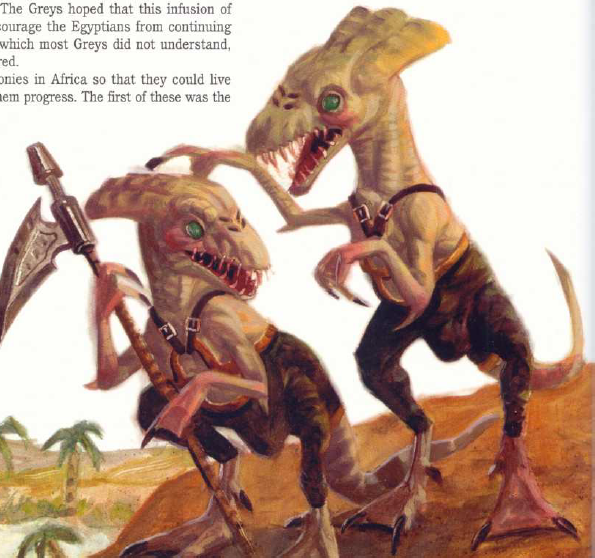 Yes, those Reptilians, the ones that every racist uncle believes secretly run the U.S government by successfully impersonating every President, ever. Anyway, their name for themselves is the Kinori, and they encounter the homo-sapiens that live in the Nile region and they get along pretty well. The Kinori are innately powerful wizards and Hermetic magic is their racial arcane school and they teach these early humans the secrets of Hermetic magic. There's plenty of arable farmland and plenty of room to expand and both species end up intermingling a fair amount and everything is copacetic. 6,000 BCE - The second group of Strangers to visit Earth rides the dark matter tide in a massive interplanetary star ship and winds up in low Earth orbit. These strangers are the alien Greys and they decide to land on Earth when their star ship systems detect massive energy fluctuations coming from what is now the island of Thera, but was then the insanely advanced nation of ATLANTIS! 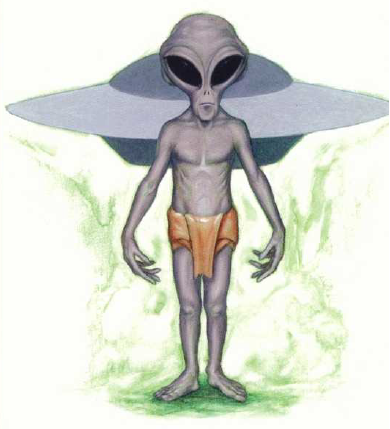 The Greys are totally the frail-bodied, bulbous-headed dudes with huge black eyes that every "I WANT TO BELIEVE" nut believes abduct human beings for recreational anal probing. The Atlanteans had unique technology that no other human civilization could match and they had already established colonies and trade routes across the Atlantic Ocean, the most significant of which was the colony city of Lubaantum (est. back in 7,500 BCE) in South America. However, the reason that the Greys decided to visit Atlantis was because the source of the mysterious energy fluctuations was a series of bizarre, green stones that covered a significant portion of the island. The Atlanteans admitted that they didn't know what purpose the stones served, and although the Greys believed that they looked manufactured as opposed to being a naturally occurring phenomena, since they were otherwise inert and not causing trouble, the Greys decide to let the issue drop. Since they had already flown all the way across the galaxy, the Greys decide to plop down stakes with the Atlanteans and they create a super-cool society full of science and psychic powers and awesome mysteries. Eventually the Kinori-backed Egyptians and the Grey-backed Atlanteans ran into each other and began a mutually beneficial cultural exchange. The Greys hated Kinori wizards for reasons that are never explained, and they hoped that by intermingling the cultures the human Egyptians would recognize the superiority of Grey science and tech and psychic powers and would abandon the Kinori sorcery. The Kinori decide not to start a war over ideology and tell the Egyptians that they can be wizards or psychics and the Kinori will still be cool either way. The hybrid Atlantean-Egyptian civilization flourishes like crazy and goes on to colonize the rest of Africa, North and South America, and even Antarctica (?) and everything is really great for everybody for a few thousand years. 2,705 BCE - The mysterious stones that originally drew the Greys to Atlantis spring to life! It turns out that the Host of Heaven was mega-pissed that the alien Greys were corrupting the children of God (man) with their technology and psychic powers and blasphemy and God finally decided that enough was enough. Angels armed with flaming swords and the wrath of the Almighty pour through the doorway that the Theran device opens and it takes the combined effort of the Kinori, Greys, and Atlantean-Egyptian empire to push back the invading Host. They manage to win, but barely, and both the Greys and the Kinori get all freaked out about the whole situation. In response, they Greys decide not to slow-leak their technology and psionic powers to humanity any more and go into full-bore cultural assimilation mode. They start uplifting the Atlanteans at an ever faster rate, holding back none of their mastery of science or psionics. The Heavenly Host caught them off guard with their initial invasion and the Greys vow that they and their Atlantean allies won't be caught unawares again. The Kinori also react, but without as much blind panic. See, the Kinori knew what the Theran device was, or at least what it could be, because all it really did was open a doorway between Earth and another dimension (in this case, the High Heavens). But since the Kinori had come to Earth via a dark matter doorway too, they at least knew how to permanently lock them shut - good ol' fashioned multi-ton stone blocks that interposed the focal point of each doorway. This ends up being the real reason for the construction of the pyramids all over Egypt - the Kinori tell their human constituents that they pyramids are monuments to dead pharoahs and etc. but what they're really doing is just piling thousands of tons of rock directly on top of all of the known doorways in Egypt. It's not a stylish science fiction solution with uncomfortable overtones of our own military industrial complex, but damnit, the problem is solved (temporarily, within Egypt). Egyptians carried on the symbolic act of building pyramids long after their practical, doorway blocking purpose ended, so not all pyramids lead to a sealed doorway. The Kinori either don't explain this solution to the Greys, or more likely, the Greys have no interest in the "solutions" provided by backwater reptile sorcerers, and the Greys decide they've got to come up with their own super-science solution to the Theran doorway. 2,150 BCE - Disaster strikes! The Greys had built a massive telluric generator next to the Theran doorway (a power plant that draws power from the planet's magnetosphere); it's not clear if the device was meant to seal it, or to re-activate it, or intended for some other unknown purpose. Before construction could be completed, something activated the generator, and in its incomplete state the device engaged in a critical core meltdown. The resulting explosion was visible from space; it shattered Thera into 3 smaller islands and basically wiped Atlantean civilization off the map in the blink of an eye. They Greys were more or less secure, as they primarily lived within the original city-ship that had brought them to Earth; however, the catastrophic failure of their first attempt at uplifting another sentient species sent shock waves through the Grey community. Some Greys thought that perhaps a group of Kinori sympathizers within Grey High Command had acted covertly to destroy the telluric generator because they feared the progress that it represented. Other believed that their human constituents in Atlantis had gotten too curious and too greedy for their own good and had ignored the Grey warnings about the device being incomplete and attempted to initiate it anyway, with apocalyptic consequences (because blaming the victim is always the easiest solution). Still other Greys believed that perhaps the Heavenly Host had managed to make covert contact with the Kinori and Atlanteans and had convinced them to destroy the device to prevent their doorway from closing, in exchange for some eternal reward in the High Heavens. If a direct cause for the catastrophe was ever found, the Greys have never revealed it. To this day, the Greys consider the clandestine destruction of the Theran generator to be the first conspiracy on Earth. The destruction of Atlantis set back human civilization hundreds of years, and all of the extant Atlantean colonies on the other continents were forced to continue forging their own path through history, no longer able to take advantage of the knowledge or advanced technology of their Grey overlords. Indeed, without the necessary maintenance for the far future devices that allowed many of the colonies to exist, most of them eventually died out, the inhabitants forced to move on to new lands and start the arduous process of creating a civilization from scratch. The human survivors of the Egyptian-Atlantean empire stuck out in blind fury. Although the Greys immediately began a self-imposed exile from Earth by boarding their massive city-ship and escaping to low Earth orbit, many of the Kinori that had originally befriended the Egyptians didn't believe that the human need for vengeance could be directed at them. They were dead wrong; in fear and frustration, the humans attacked the only remaining Strangers they could find. Overnight, the Kinori found themselves the victims of unmitigated human aggression, and they were forced to flee into the hidden, deep warrens they had dug as emergency bunkers for just such an occasion. With the retreat of Strangers from the world stage, human history began the slow process of rebuilding. It would be millennia before human civilization had reached a point where they had recovered even one-tenth of the scientific and technical knowledge that was lost with the destruction of Atlantis. NEXT TIME: The entirety of Native American civilization is created as a prank by particularly mischievous Greys.
|
|
|
|
PurpleXVI posted:That's some amazing loving metaplot. REPTOID SORCERERS ALLY WITH ATLANTIS AND ALIEN GREYS TO BATTLE GOD'S ANGELS OVER THE FATE OF HUMANITY. Like that's some amazing poo poo that not even loving oMage could come up with. in the sense that the Dark*Matter universe is supposed to be a place where any random National Enquirer headline about "OBAMA HAS A GAY MUSLIM SON WITH REPTILIAN CLONE OF HILARY CLINTON" is objectively true, they hit the ground running and never let off the gas.
|
|
|
|
Mors Rattus posted:The Kinori are adorable and cool. Pity the Greys seem to be handled way, way less well. the Kinori just wanted to be wizard-bros with homo sapiens and chill. the book never explains what they were running from in their home dimension that caused their exodus to Earth, but it's clear they're just glad to have found another hospitable planet with native species that weren't immediately hostile. it's possible they may have tried to backstab humans later along, but they had peaceful co-existence for nearly 4500 years before the Greys showed up, so my guess is things would have stayed on an even keel. to me, there's pretty a pretty clear "nature=good / science=bad" undertone to the whole metaplot. the Kinori are intended to represent an idealized society of noble savages (Hermetic arcana is just their tribal magic after all) and the Greys are a pretty clear allegory for European imperialism and "civilizing the savages" and the white man's burden and etc. and based on the body of work that Cook has since produced, I don't think this is a disingenuous reading of subtext. I also get a strong sense that the Greys are a stand-in for the U.S. military industrial complex, in as much as they are alien outsiders with a massive technological advantage that decide to muscle their way into the affairs of other nations uninvited, then cause a series of predictable gently caress-ups with their careless application of future tech, and then they zip off to the stars more or less unscathed when their plans fall apart with catastrophic consequences. the indigenous people are left holding the bag and the Greys get to act like nothing they did was their fault and then move on to the next global gently caress-up (and boy do they seem to cause them left and right)
|
|
|
|

|
| # ¿ Jul 27, 2024 04:05 |
|
Kurieg posted:The gently caress? this game sounds... good? the opening is really gonzo, but remember, this is all supposed to have happened thousands of years before the game actually starts. now, if they had instead decided to make the main setting take place during the war between Kinori, Greys, humans, and the Host, that would have been a much more awesome campaign setting. you could certainly do that yourself, but at that point you're not playing Dark*Matter any more. by the time the players can get involved in the game, all of that awesome poo poo has long since passed. however! the entire premise of the overarching Alternity metaplot (of which Dark*Matter is a subset) is that every Alternity campaign setting is occurring simultaneously (albeit in different dimensions and timelines) and one recommended style of play in the core Alternity book is that the players are intergalactic tourists that hop between timelines and dimensions and get to briefly interact with whatever poo poo is happening in each campaign setting before warping off to another setting. essentially a combination between spelljammer and quantum leap, and if you played Alternity under that premise, the game becomes 100% more interesting than if you try to play just the Dark*Matter campaign setting with a completely straight face. edit: my high school homebrew Alternity campaign literally did what is mentioned above. the game started in the Alternity version of Gamma*World, and when the players had gotten bored with loving around there, I had them find the means to travel to other Alternity settings. needless to say, a bunch of Gamma*World refugees make for quite a fish-out-of-water scenario when they warp into the Dark*Matter setting. I also decided that common races all had the same ancestors, so (for example) the Kinori were also the T'sa from core Alternity and they were also the Sleeth from Gamma*World and they had all just become displaced between different dimensions / timelines. Freaking Crumbum fucked around with this message at 16:38 on Oct 17, 2017 |
|
|






